Archivio riviste
2025/4

Focus. I fattori di cambiamento della mobilità urbana
- I fattori di cambiamento della mobilità urbana , Zerbini Fabrizio
- Da modelli del passato a traiettorie future. Le pratiche di mobilità della Generazione Z , Borghini Stefania, Colm Laura, Medici Beatrice
- Risultati di una ricerca interculturale: spazio ai veicoli elettrici nel settore turismo , Gaur Aakanksha
- Superare barriere di costo e disponibilità. La svolta collaborativa nella micromobilità urbana , Sorbino Francesco
- Comportamenti di ricarica nei centri urbani. L’elettrico ha bisogno di ecosistemi energetici , Cirrincione Armando
Visual readings
Science
- Creare valore nelle reti globali basate sulla conoscenza. La fiducia come leva strategica di collaborazione , Blomqvist Kirsimarja, Michailova Snejina, Snow Charles C.
- Un’analisi sull’engagement degli stakeholder. Comunicare la sostenibilità con l’Account-Based Marketing , De Giovanni Pietro, Spahiu Esli, Spinosi Lorenzo, Vishkaei Behzad Maleki
2025/3
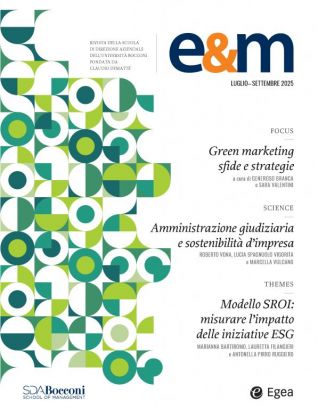
Focus. Green marketing: sfide e strategie
- Indicazioni per una comunicazione sostenibile: strategie di green marketing nei contenuti video , Losito Cristoforo, Farace Stefania, Tuan Anna Maria, Montaguti Elisa
- Il mercato alimentare italiano: comunicare la sostenibilità attraverso il packaging , Branca Generoso, Shi Qiaoni, Valentini Sara
- Un quadro strategico per l’azione: l’impatto comportamentale delle mobilitazioni climatiche , Shi Qiaoni, Valentini Sara, Zhou Liyang
- Il consumo nei settori dell’elettronica e dell’abbigliamento. Riconciliare sostenibilità e accessibilità economica , Batelli Micol, Di Iorio Vinicio, Frey Marco, Iovino Roberta, Testa Francesco
Visual readings
Science
Themes
- Social Return On Investment: misurare l’impatto delle iniziative ESG , Bartiromo Marianna, Filangieri Lauretta, Pirro Ruggiero Antonella
- Reazioni organizzative alle valutazioni di esperti e consumatori nell'alta cucina , Di Stefano Giada, Favaron Saverio D.
- Il paradosso di Apple: quando l’eccellenza diventa vulnerabilità , Papadimitriou Thanos
2025/2
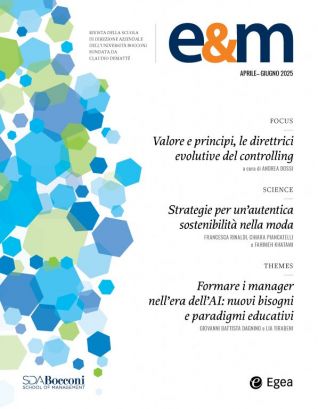
Focus. Valore e principi, le direttrici evolutive del controlling
- Oltre l’aggiornamento della prassi. Valore e principi, le direttrici evolutive del controlling , Dossi Andrea
- ESG e sistemi di controllo aziendale. Un nuovo paradigma per misurare il valore , Caglio Ariela
- Integrare indicatori e strategia. Sistemi di misurazione a supporto dell’execution , Meloni Gianluca, Morelli Marco
- Realtà e prospettive. AI e controllo di gestione, vantaggi e criticità , Dossi Andrea, Santoli Eleonora
Visual readings
Science
- La trappola del greenwashing: strategie per un’autentica sostenibilità nella moda , Romana Rinaldi Francesca, Piancatelli Chiara, Khatami Fahimeh
- Engagement e turnover dei dipendenti. Il ruolo strategico del welfare aziendale , Dell’Acqua Alberto, Anconetani Rachele, Colantoni Federico, Santoli Eleonora
Themes
2025/1
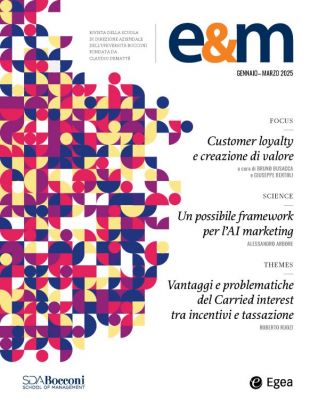
Focus. Customer loyalty e creazione di valore
- La fedeltà dei clienti come leva strategica: customer loyalty e creazione di valore , Busacca Bruno, Bertoli Giuseppe
- Loyalty oltre lo sconto. Trend e sfide per la GDO italiana , Acconciamessa Emanuele
- L’analisi del concetto di loyalty: relazione con il brand a quattro dimensioni , Ciacci Andrea, Mantovani Alice, Branca Generoso
- Indicatori a breve o lungo termine: quali metriche contano davvero , Penco Lara, Testa Ginevra
- Il modello TCC: trasformare i dati in vantaggio competitivo , Branca Generoso, Ciacci Andrea, Katris Damien, Rubashkina Yana
Visual readings
Science
Themes
- Vantaggi e problematiche del Carried interest tra incentivi e tassazione , Ruozi Roberto
- Corporate & Investment Banking: la percezione di GenZ e Millennials , Accettura Roberta, Pirro Ruggiero Antonella, Rossi Riccardo, Sisti Alessia Giorgia
- Convertire gli stati d’animo in strategie con la Moods Matrix , Castelli Paola Rita, Perotto Pierpaolo
2024/4
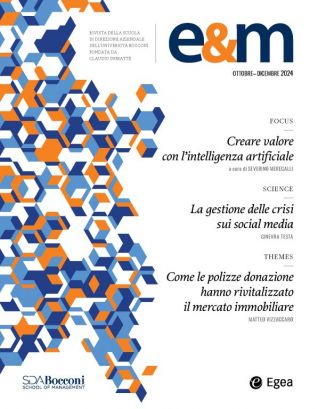
Editoriale
Focus. Creare valore con l'intelligenza artificiale
- Creare valore con l’AI. Strategie aziendali in chiave post-digital , Meregalli Severino
- Implementare l’AI: una rassegna dei fattori critici , Ciacci Andrea
- Dall’hype tecnologico alla realtà: l’applicabilità a tre dimensioni , De Rossi Leonardo Maria, Diaferia Lorenzo
- Casi aziendali di successo: approccio sistematico e multilivello , Ciacci Andrea, Raimondi Claudio
Science
2024/3
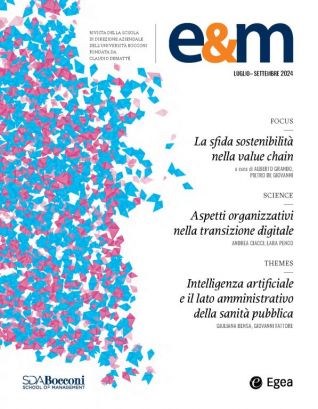
Focus. La sfida sostenibilità nella value chain
- La sfida sostenibilità nella value chain. Adozione degli standard GRI crescente e da rafforzare , Trindade Maria A. M., Grando Alberto FREE
- L’impatto sulle performance aziendali. Il business sostenibile migliora la resilienza , Maleki Vishkaei Behzad, De Giovanni Pietro FREE
- La risposta a eventi shock. Time to recovery, indicatori e strategie , Ruzza Daniel FREE
Science
Themes
- Signature customer experience. Verso un’esperienza aumentata e firmata , Di Dio Roccazzella Marco, Saviolo Stefania
- Intelligenza artificiale e il lato amministrativo della sanità pubblica , Bensa Giuliana, Fattore Giovanni
- Il marketing del Padrino come nuovo modello con rischi e benefici , Guido Gianluigi
2024/2
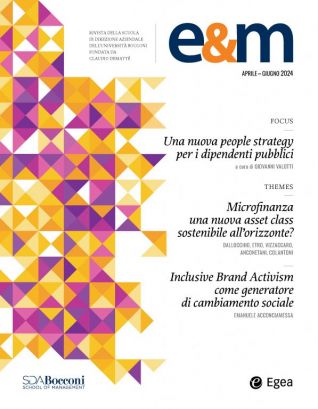
Focus. Una nuova people strategy per i dipendenti pubblici
- Guardare al domani. Una nuova people strategy per i dipendenti pubblici , Valotti Giovanni
- Strategia e proattività. Una gestione del personale a misura di futuro , Buongiorno Sottoriva Claudio, Valotti Giovanni
- Dati, relazioni, digitale. L'innovazione è questione di nuove competenze , Vidè Francesco, Giacomelli Giorgio
- Guerra dei talenti o pesca a strascico? Bilanciare esigenze di reclutamento e qualità , Lenzi Lavinia, Saporito Raffella
- Un nuovo approccio. Performance da valutare guardando allo sviluppo , Barbieri Marta, Micacchi Marta
- Innovazione, demografica, climate change. Dalla Commissione europea un aiuto in formato ComPAct , Dotto Daniele
Visual readings
Themes
- Modelli di rating esperti per navigare il new normal dell’incertezza , Ciampi Francesco
- Microfinanza, una nuova asset class sostenibile all’orizzonte? , Dallocchio Maurizio, Etro Leonardo L., Vizzaccaro Matteo, Anconetani Rachele, Colantoni Federico
- Inclusive brand activism come generatore di cambiamento sociale , Acconciamessa Emanuele
- Internet of Beings o della rivoluzione in sanità con IA e hyper data , Grillo Francesco
- La mobilità urbana nella prospettiva della Generazione Z , Borghini Stefania, Cirrincione Armando, Colm Laura, Gaur Aasha, Medici Beatrice, Sorbino Francesco
2024/1
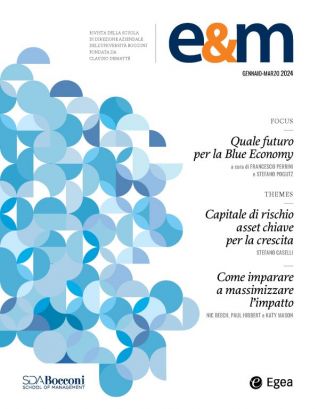
Editoriale
Focus. Quale futuro per la Blue Economy
- Una nuova sfida per tutti. Proteggere gli oceani per un pianeta sostenibile , Pogutz Stefano, Perrini Francesco, Pachner Jan Hans Georg, Sardà Rafael, Fumagalli Federico
- L’importanza dell’ecosistema. Anche per le imprese è ora di agire , De Silvio Manlio, Fumagalli Federico, Daminelli Roberta, Andreoni Marta, Magni Giulio
- Il futuro della blue economy. Dalla mitigazione dei rischi alle opportunità di business , Cozzi Ambra, Galvani Laura, Biggi Livia, Theodorou Nikolaos Alexandros, Strina Maria Giulia
- La Ocean Disclosure Initiative. Una nuova piattaforma per cambiare insieme , Pogutz Stefano, Perrini Francesco, De Silvio Manlio, Pachner Jan Hans Georg, Magni Giulio, Fumagalli Federico, Cozzi Ambra
Visual readings
Themes
- Capitale di rischio. Asset chiave per la crescita , Caselli Stefano
- Guida etica all’intelligenza artificiale , Vicari Salvatore
- IA a misura del buon management , Sciarelli Sergio
- Come imparare a massimizzare l’impatto , Beech Nic, Hibbert Paul, Mason Katy
- La via europea al management. Sogno o realtà? , Zattoni Alessandro
- Il marketing fra digitale e sostenibilità , Busacca Bruno, Bertoli Giuseppe
- Il lato umano dell’hi-tech il caso dei dispositivi per l’udito , Fornari Valentina
- Sos debito. Imprese in cerca di nuovi modelli , Ruozi Roberto
2023/4
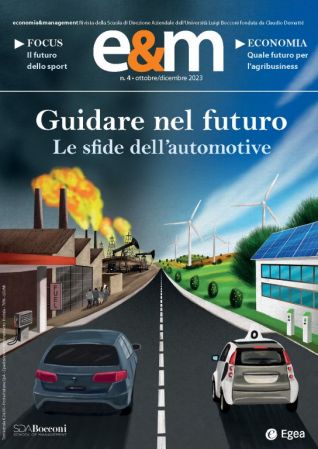
Editoriale
Dossier. Guidare nel futuro
- Le grandi sfide dell’industria italiana , Zirpoli Francesco
- Un grande futuro dietro le spalle? , Perugini Mario
- La parola d’ordine è trasformazione , De Meo Luca
- Politiche pubbliche per il rilancio , De Palma Michele
- Benefici attesi e reali di Industria 4.0 , Giulio Calabrese Giuseppe
- Transizione all’elettrico: i rischi occupazionali , Bubbico Davide
- Mobilità sostenibile tra obbligo e aspirazione , Colm Laura
- Collaborazioni efficaci per l’innovazione di frontiera , Moretti Anna, Li Pira Stefano
Focus. Agribusiness tra presente e futuro
- Tutti gli ingredienti della resilienza della supply chain , Lo Zoppo Marianna, Amico Biagio Maria
- La rigenerazione dei suoli passa per il sistema bancario , Fiorillo Vitaliano, Amico Biagio Maria, Bottacin Leonardo
- Vertical Farming: dall’hype ai disinvestimenti , Lo Zoppo Marianna, Giannetti Federico
- Collaborare è difficile ma per le filiere è necessario , Saputo Aristea
Focus. Il futuro dello sport tra valore e valori
- Un modello di sport tra spirito olimpico e (iper) professionismo , Ruta Dino
- La Milano dei Giochi: sportiva, inclusiva e sempre più aperta , Billari Francesco C.
- Atleti e carriera: la partita si gioca anche fuori dal campo , Ruta Dino, Antonelli Luca
- Una legacy (in)tangibile: quel che resta degli eventi sportivi , Bigotto Chiara, Palmieri Antonio
- Perché gli impianti sportivi sono per tutti un business vincente , Ruta Dino, Palmieri Antonio
- Al di là della vittoria: il fan engagement tra identità e comunità , Antonelli Luca, Raccagni Deborah
Intelligenza Artificiale
2023/3

Dossier. Voglia di lusso. Esperienze, pratiche, valori
- La luxury experience come modus vivendi , Calefato Patrizia
- Un mercato in crescita malgrado le incertezze , D’Arpizio Claudia, Levato Federica
- I player globali fanno shopping dei piccoli , Baro Jessica, Dallocchio Maurizio, Etro Leonardo
- Discrezione e ricercatezza alla base del quiet luxury , Carraro Stefania, Misani Nicola
- L’eccellenza si fa in gruppo: il caso Florence , Lojacono Gabriella
- NFT per una nuova relazione con i clienti , Ru Yun Pan Laura
- L’autenticità genera unicità, fiducia e fedeltà , Lojacono Gabriella
- Personalizzare il prodotto ma con moderazione , Prandelli Emanuela
- Luxury Hospitality: sfide, tendenze, buone pratiche , Kim Sowon, Girardin Florent, Fuchs Matthias
- Crescita del fine dining: il caso Langosteria , Lanza Pietro
- La gioielleria tra continuità e trasformazione , Vigneron Cyrille
Focus. L’era artificiale (ma non troppo)
- Guardare con attenzione attraverso lo specchio digitale , Castelli Gianluigi, Meregalli Severino
- Cybersecurity e aziende: se il virus peggiore è la mentalità , Abbatemarco Nico
- Metaversi possibili. Archetipi e casi d’uso per andare oltre la bolla , De Rossi Leonardo M., Salviotti Gianluca
- Qui la penna, ChatGPT! L’AI generativa alla prova del testo , Diaferia Lorenzo
Pubblica Amministrazione
2023/2
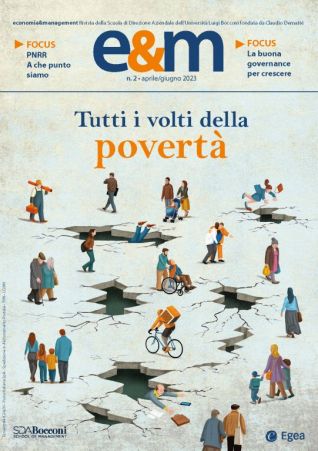
Editoriale
DOSSIER. Tutti i volti della povertà
- Il «regime di povertà» tutto italiano , Saraceno Chiara
- Storie svantaggiate come eredità , De Lauso Federica
- Giovani e lavoro. Una questione cruciale , Bertolini Sonia, Borgna Camilla, Romanò Sara
- La povertà educativa richiede scelte forti , Curti Sabina
- Ripensare il Reddito di Cittadinanza , Lenzi Antonio
- Più luce nel mondo dei senza dimora , Cortese Caterina
- Dacci oggi il nostro Pane Quotidiano , Perretti Fabrizio, Simonella Zenia
FOCUS. Tutte le strade portano al Pnrr?
- L’allocazione territoriale delle risorse tra luci e ombre , Altomonte Carlo, Biasioni Francesco, Gottardo Giulio
- Gli investimenti richiedono una nuova leadership nel settore pubblico , Vecchi Veronica, Cusumano Niccolò, Motta Lorenzo, Saporito Raffaella
- Semplificare per crescere e vincere la corsa contro il tempo , Micacchi Lorenza, Lenzi Lavinia, Valotti Giovanni
- La sfida di Comuni e città è investire in progetti reali , Nicotra Veronica
FOCUS. La buona governance fa crescere (in più direzioni)
- Effetti positivi sulle performance sia diretti sia indiretti
- I temi di conformità sono fattori rilevanti per le scelte strategiche , Acerbis Fabrizio
- Le sfide epocali degli anni Venti l’intermediazione finanziaria , Ragaini Andrea, Albonico Marzio
- Crescere per preservare le eccellenze italiane: il ruolo degli investitori , Paoli Tommaso
SOSTENIBILITÀ
SOSTENIBILITÀ DIGITALE
INNOVAZIONE E MARKETING
2023/1
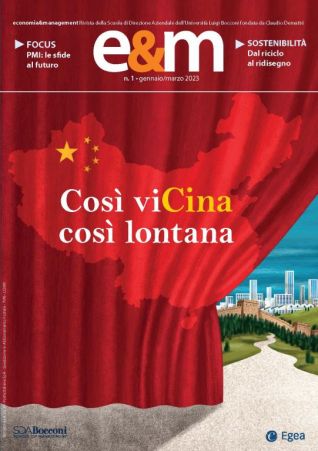
Dossier. Così viCina così lontana
- L’internazionalizzazione della moneta cinese , Amighini Alessia
- Il cerchio magico di Xi Jinping , Attanasio Ghezzi Cecilia
- La strategia americana per contenere Pechino , Pugliese Giulio
- Rischi e opportunità per le aziende italiane , Zadro Alessandro
- Nuove Vie della Seta: una, nessuna e centomila
- Leadership multiculturale come leva di successo , Zhou Fei Francesco
- Fare business in Cina: il caso Brembo , Simonelli Silva Umberto
- Se internet incontra la Grande Muraglia , Negro Gianluigi
- Il mito delle guanxi: cosa sappiamo davvero , Opper Sonja
- L’intraducibile diventa una sfida al management , Pontiggia Andrea, Morbiato Anna
Focus. Piccole e Medie Imprese: le sfide al futuro
- PMI e continuità di successo nei nuovi scenari competitivi , Tripodi Carmine
- Un triennio complesso che porta con sé problemi e opportunità , Puricelli Marina
- Affrontare il new normal: competenze, risorse e leadership , Visconti Federico, Lazzarotti Valentina
- Le quattro strategie per promuovere pratiche sostenibili , Perrini Francesco, Pogutz Stefano, De Silvio Manlio
- Gestione della diversità: un territorio esteso ancora da esplorare , Basaglia Stefano
Fusioni e acquisizioni
Internazionalizzazione
Amministrazione e controllo
Organizzazione e People Management
2022/4
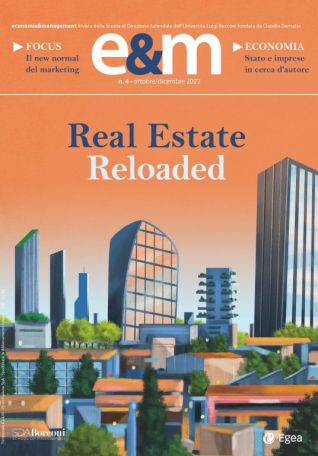
Dossier. Rigenerazione urbana
- Il circolo virtuoso della sostenibilità , Bezzecchi Alessia
- Le opportunità di rigenerazione urbana , Beltratti Andrea, Bezzecchi Alessia, Abbadessa Mario, Albertini Petroni Davide, Della Posta Giovanna , Ruckstuhl Andrea
- Rigenerazione sostenibile e finanza green , Beltratti Andrea, Bezzecchi Alessia, Coticoni Stephen, Serrini Riccardo, Tedesi Luca, Turri Lia
Dossier. Living
- Nuove esigenze sociali al centro del living , Beltratti Andrea, Bezzecchi Alessia
- Largo al proptech come leva di crescita , Beltratti Andrea, Bezzecchi Alessia, Cominelli Barbara, Grillo Marco
- Nuove esigenze abitative e risposte del mercato , Beltratti Andrea, Bezzecchi Alessia, Adduci Pietro, De Albertis Regina
- Le nuove logiche di riequilibrio territoriale , Beltratti Andrea, Bezzecchi Alessia, Mazzanti Alessandro, Ricciardi Paola
Dossier. Commercial
- Le grandi trasformazioni del settore commerciale , Morri Giacomo, Benedetto Paolo
- Gli uffici cambiano gli investimenti anche , Morri Giacomo, Benedetto Paolo, Al Salhi Muhannad, Catella Manfredi, Dal Pastro Alexei
- L’esperienza cliente cuore dell’hospitality , Morri Giacomo, Basterrechea Chema, Keller Stefano, Schiavo Giampiero
- Retail e logistica due facce della stessa medaglia , Morri Giacomo, Sandberg Joachim, Véron Eric
Focus. Il new normal del marketing
- Il new normal del marketing , Castaldo Sandro, Zerbini Fabrizio
- Quando le immagini diventano un serbatoio di dati per le aziende , Cillo Paola, Grossetti Francesco, Rubera Gaia
- Brand management: fra Ritorno al futuro e Interstellar , Busacca Bruno, Ostilli Maria Carmela
- I punti chiave della trasformazione digitale del go-to-market , Castaldo Sandro, Zerbini Fabrizio
- Dieci aree di azione per ridisegnare la funzione vendite , Caiozzo Paola, Colm Laura Ingrid Maria, Guenzi Paolo, Aurelio Sisti Marco
Visual readings
Organizzazione e People Management
2022/3
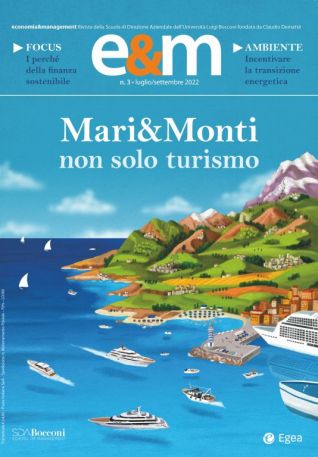
Dossier. Mari&Monti
- Le nuove tendenze del turismo balneare , Antonioli Magda, Bricchi Sara
- Tecnologie e sostenibilità vanno in crociera , Pellegrino Domenico
- Tradizione e innovazione per la nautica di lusso , Saviolo Stefania
- L’industria della pesca tra minacce e opportunità , Sabatella Evelina Carmen
- Il turismo di montagna in transizione , Mottironi Cristina
- Nuovi abitanti in territori montani , Corrado Federica
- La città ha bisogno della montagna , Golino Antonella
- La grande sfida di Milano-Cortina , Antonioli Magda
Focus. La finanza sostenibile
- La finanza sostenibile. Perché deve cambiare , Dallocchio Maurizio
- Rating ESG e di credito come valutare il rischio integrato , Calcaterra Michele
- Quanto impatta la sostenibilità sul costo del capitale , Caragnano Alessandra
- Accelerare la transizione anche i servizi finanziari devono fare la loro parte , Marchesi Cecilia
- La creazione di valore tramite gli strumenti di debito sostenibile , Pippo Federico, Talamini Andrea
- Responsabilità sociale, sostenibilità ambientale e rating ESG nelle PMI italiane , Lanza Andrea, Roscio Anna Maria
Economia ambientale
Finanza straordinaria
Economia, lavoro e organizzazioni
2022/2
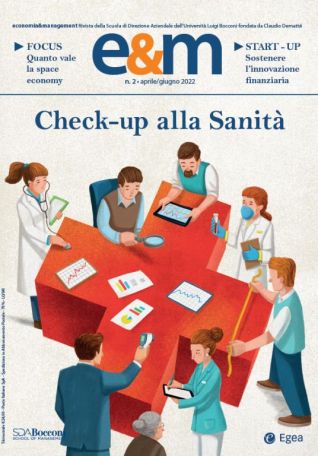
Dossier. Check-up alla Sanità
Dossier. Lezioni dall’era Covid-19
- Le quattro epoche del SSN in due anni , Longo Francesco
- Destinazione valore in Sanità , Lecci Francesca, Foresti Luca
- Operation management come fattore critico , Fenech Lorenzo
- La grande sfida del personale , Montanelli Roberta, Sartirana Marco
- Direttori generali di fronte alla crisi , Del Vecchio Mario, Romiti Anna
- Quale contributo dagli operatori privati , Preti Luigi Maria, Ricci Alberto
Dossier. Ricerca & Servizi
- Com’è cambiata la catena del valore , Borgonovi Elio, Ripa Di Meana Francesco
- La digitalizzazione tra certezze e opportunità , Boscolo Paola Roberta, Tarricone Rosanna
- L’impatto del PNRR sulle cure , Tozzi Valeria, Casati Giorgio
- Innovazione cercasi per la terza età , Notarnicola Elisabetta, Perobelli Eleonora, Rotolo Andrea
- Generare valore con acquisti e investimenti , Vecchi Veronica, Cusumano Niccolò, Tanese Angelo
Focus. Tutto il valore della Space economy
Focus. Space economy
- L’importanza del rapporto pubblico-privato , Iacomino Clelia, Pianorsi Mattia, Saputo Aristea
- Perché e come ridurre la grande quantità di detriti spaziali , Iacomino Clelia, Pianorsi Mattia, Saputo Aristea
- Verso la Luna per l’esplorazione interplanetaria , Iacomino Clelia, Pianorsi Mattia, Saputo Aristea
Strategia e imprenditorialità
Project Management
Organizzazione e People Management
2022/1
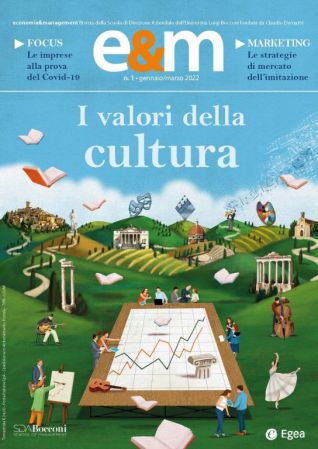
Dossier. Introduzione
Dossier. Innovazione & tradizione
- Forza e fragilità della lettura , Dubini Paola
- Le prossimità delle biblioteche , Faggiolani Chiara
- La transizione digitale dei musei , Guerzoni Guido
- Strategie di innovazione per il patrimonio museale , Monti Alberto
- Nuove esperienze di consumo il caso FAI , Rurale Andrea, Carù Antonella, Dalle Carbonare Piergiacomo Mion
- L’impatto dei NFT sul sistema dell’arte , Pola Francesca
Dossier. L’Agenda 2030 e i territori
- Welfare culturale oltre la sperimentazione , Cicerchia Annalisa
- Capitali della cultura prove di futuro , Baia Curioni Stefano, Morganti Ilaria
- Le corporate collection e performance d’impresa , Paolino Chiara
- Nomadismo digitale come opportunità per il turismo , di Salle Marianna, Mottironi Cristina
- La rigenerazione dei Lazzaretti Veneziani , Fazzini Giorgia
- Multiculturalismo, diversità e strategie di inclusione , Lucchetti Marco, Turrini Alex
Focus. Introduzione
Focus. Le imprese alla prova del Covid-19
Digital marketing
Organizzazione e People Management
Sociologia economica
2021/4
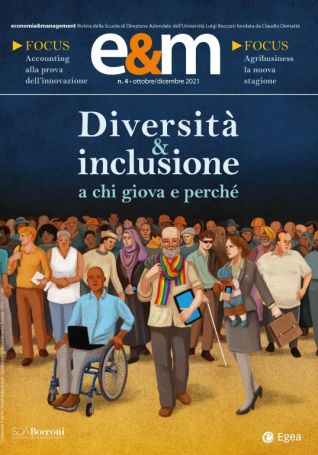
Editoriale
Dossier. Scenario e sfide
Dossier. Imprese, società e diritto
- Gender pay gap il ruolo delle imprese , Casarico Alessandra FREE
- Donne e PA un caso di successo a metà , Saporito Raffaella, Rota Silvia, Trinchero Elisabetta FREE
- Bilancio di genere quale sarà il futuro , Galizzi Giovanna
- Che cosa può e deve fare il sindacato , Pulcher Simone
- Gestire la disabilità oltre lo stigma , Cuomo Simona, Simonella Zenia
- Sulla questione migranti è tempo di scelte , Monaci Massimiliano
- Il corpus normativo contro la discriminazione , Lorenzetti Anna
Visual readings
Focus. Accounting
Focus. Agribusiness
People management
2021/3
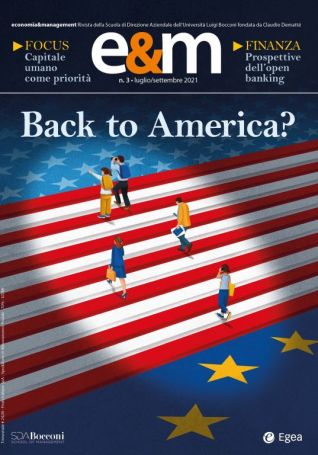
Dossier. Geopolitica
Dossier. Imprese e modelli manageriali
- Sulle piattaforme digitali è scontro (quasi) totale , Colangelo Giuseppe FREE
- Le opportunità commerciali e le possibili insidie , Miranda Lucio
- La nuova rotta oltreoceano della moda italiana , Marafioti Elisabetta
- Strategie di successo per l’agroalimentare , Veronesi Vittoria, Pirotti Guia Beatrice, De Angelis Corvi Elena FREE
Focus. Politica economica
Visual readings
Il dibattito. Stato vs mercato
Comportamento organizzativo
Strategia e imprenditorialità
Strategic management
Marketing strategico
Innovation & Operations Management
2021/2
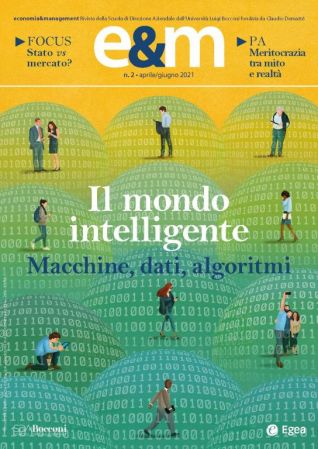
Dossier. Contesto di riferimento
- Intelligenza artificiale cosa c’è dietro , Diaferia Lorenzo, Salviotti Gianluca FREE
- Come creare valore con l’economia dei dati , Cillo Paola, Rubera Gaia FREE
- Innovazione e algoritmi da maneggiare con cura , Corrocher Nicoletta, Guerzoni Marco, Nuccio Massimiliano Nuccio
- Le ragioni per essere ottimisti in Italia , da Empoli Stefano
Dossier. Gestione&Applicazione
- Gli advanced analytics a supporto delle decisioni manageriali , Borgonovo Emanuele, Molteni Luca FREE
- Sfide e soluzioni per il settore bancario , Omarini Anna
- Competenze, etica e sicurezza al servizio della salute , Ciani Oriana
- Benefici dell’algoritmo nell’organizzazione aziendale , Pedronetto Paolo
- Data scientist chi è, cosa fa e come lo fa , Molteni Luca, Poli Maurizio
Focus. Stato vs Mercato?
Visual readings
Pubblica amministrazione
Business Strategy
Strategy & Entrepreneurship
2021/1
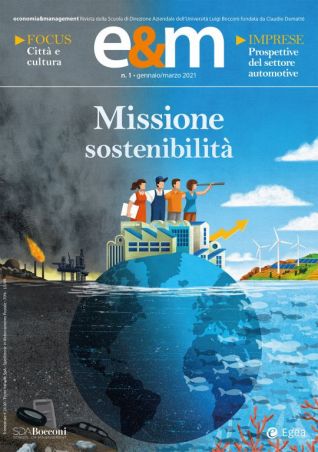
Dossier. Introduzione
Dossier. Imprese e scenario globale
- Agenda 2030: l’appuntamento che riguarda tutti , Giovannini Enrico, Perrini Francesc, Pogutz Stefano, Casati Paola FREE
- La centralità della governance aziendale , Minichilli Alessandro, Perrini Francesco, Casati Paola
- I rating ESG: amarli o odiarli? , Perrini Francesco, Iantosca Anna
- Dalla competizione alla collaborazione , Tencati Antonio
- Perché e come essere B Corp o Società Benefit , Misani Nicola
- Quando la marca trasforma la catena del valore , Morici Giuseppe, Pogutz Stefano FREE
Dossier. Prospettive alternative
- La decarbonizzazione e le sfide di Big Oil , Di Castelnuovo Matteo, Biancardi Andrea
- Tutte le potenzialità della blue economy , Pogutz Stefano, De Silvio Manlio, Fumagalli Federico, Pachner Jan, Magni Giulio
- Sustainability leader per la protezione dell’oceano , Allevi Virginia, Saputo Aristea, Rizzi Giorgia, Daminelli Roberta
Focus. Introduzione
Focus. Città e cultura
Visual readings
Pubblica amministrazione
People management
Sales management
2020/5
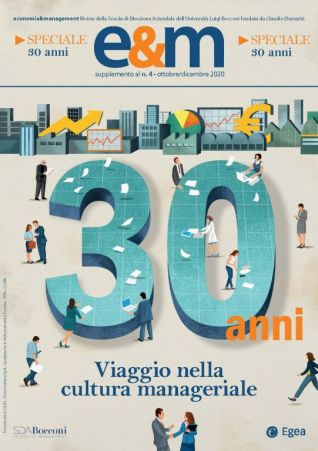
- Speciale 30 anni Economia&Management
- La forza delle radici per anticipare il futuro , Soda Giuseppe
- 1988-1997: il dibattito sui modelli d’impresa , Basaglia Stefano, Simonella Zenia
- 1998-2007: tra cambiamenti interni e New Economy , Basaglia Stefano, Simonella Zenia
- 2008-2018: come leggere il dopo-crisi , Simonella Zenia, Basaglia Stefano
- I trent’anni della rivista: una visione d’insieme , Basaglia Stefano, Simonella Zenia
- Governo d’impresa: fra arte e professione , Dematté Claudio
- Essere interessanti in modo rigoroso , Perrone Vincenzo
- Conoscenza come fattore di competitività , Corbetta Guido
- Ampliare l’orizzonte senza pregiudizi , Perretti Fabrizio
2020/4
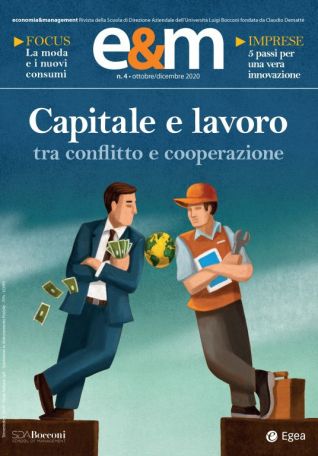
Dossier. Ripensare la globalizzazione
- Lo Stato in economia? Conta la qualità , Zamagni Vera
- Una nuova gestione dei mercati globali , Calabrò Antonio
- Perché sarebbe utile tornare a leggere Marx , Bellofiore Riccardo, Vertova Giovanna
- Le relazioni industriali al tempo della globalizzazione , Pedersini Roberto
- La domanda aggregata è il problema italiano , Perugini Mario
Dossier. Chi rappresenta cosa
- Tutti i dubbi e le sfide in casa Confindustria , Berta Giuseppe Berta
- Impresa-lavoro: pari dignità e una progettazione comune , Perretti Fabrizio, Landini Maurizio FREE
- Quattro possibili destini per il sindacato , Reyneri Emilio
- Come e perché è cresciuta la solitudine dei precari , Colella Francesca
- Un nuovo modello di co-responsabilità , Del Chicca Andrea, Mancini Alessandro
Visual readings
Focus. L’industria della moda e i nuovi consumi
Innovation & Operation Management
Sharing economy
Digital Procurement
2020/3
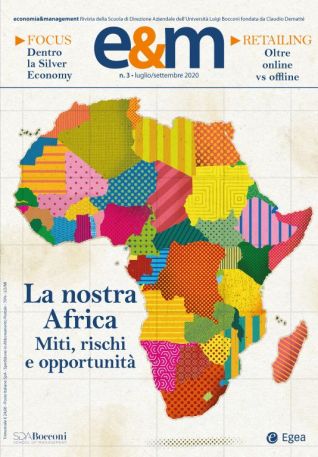
Dossier. Sviluppo economico-politico
Dossier. Società e ambiente
Dossier. Business e imprese
Visual readings
Focus. Silver Economy
- Come è cambiato il profilo demografico , Salaris Luisa
- Age management scelta di necessità , Gravaglia Emma
- Se gli anziani diventano uno stimolo per un nuovo welfare , Berloto Sara, Longo Francesco, Notarnicola Elisabetta, Perobelli Eleonora, Rotolo Andrea
- Il consumatore longevo, anzi senza età , Palmarini Nicola FREE
- La grande distribuzione alla conquista del cliente silver , Buccoliero Luca, Bellio Elena
Contabilità e bilancio
Mergers & Acquisitions
Pubblica amministrazione
2020/2
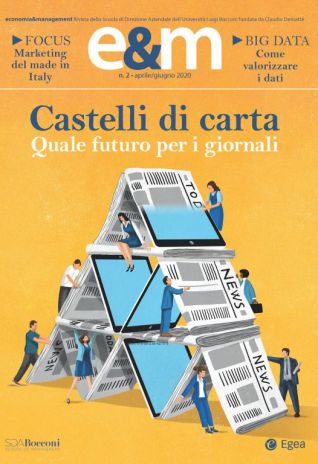
Dossier. Lo scenario
Dossier. L'industria dell'informazione
Dossier. La dieta mediatica
Visual readings
Focus. Marketing del made in Italy
- Di cosa parliamo quando parliamo di made in Italy , Costabile Michele
- Specificità culturali e qualità delle produzioni , Ancarani Fabio, Costabile Michele, Mazzù Marco Francesco
- Perché e come difendere la nostra coolness , Costabile Michele, Fei Carlo, Mazzù Marco Francesco
- La domanda e l’offerta di unicità , Costabile Michele, Mazzù Marco Francesco
Digital transformation
Organizzazione
Sistemi finanziari
2020/1
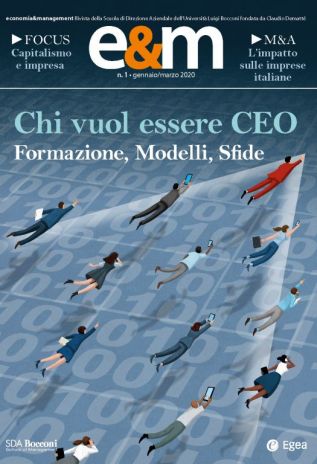
Dossier. Formazione
Dossier. Modelli
Dossier. Sfide
Dossier. Corporate Governance
Visual readings
Focus. Capitalismo e impresa
Compensation
Speciale 30 anni di Economia & Management
2019/4
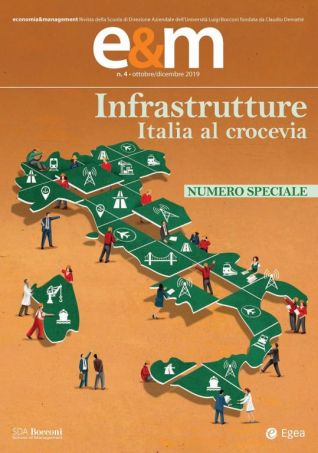
Editoriale
Dossier. Infrastrutture, Italia al crocevia
Dossier. Infrastrutture, Italia al crocevia: i trasporti
Dossier. Infrastrutture, Italia al crocevia: le reti
- Il futuro digitale del sistema Italia
- 5G: infrastruttura in cerca di autore
- Digitalizzare è un must
- Per la Gigabit society servono nuove regole
- Il progetto Open Fiber come e perché
- Le reti al centro dell’ecosistema urbano
- Infrastrutture elettriche per il domani
- Transizione elettrica tra presente e futuro
Dossier. Infrastrutture, Italia al crocevia: i territori
Visual readings
2019/3
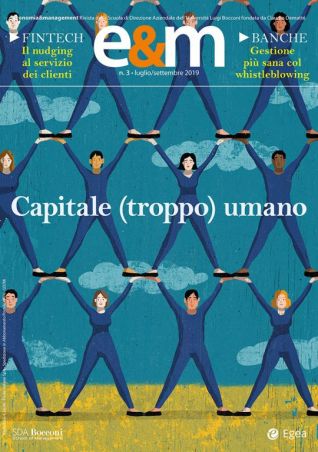
Editoriale
Dossier: capitale (troppo) umano
Dossier: lo scenario
Dossier: recruiting e selezione
Dossier: carriera
Dossier: istituzioni e rappresentanza
Visual readings
Servizi finanziari
Speciale 30 Anni di Economia & Management
2019/2
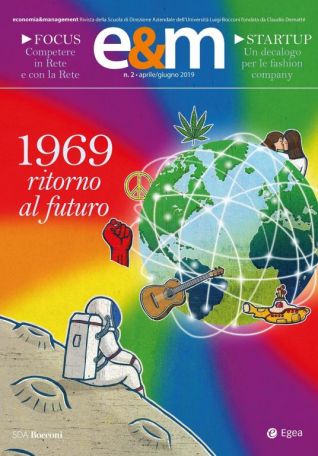
Dossier: 1969, ritorno al futuro
Dossier: scienza e tecnologia
Dossier: capitale e lavoro
Dossier: diritti civili
Dossier: sesso, droga e rock'n'roll
Visual readings
Focus: Competere in Rete e con la Rete
Sharing economy
Imprenditorialità
Speciale 30 Anni di Economia & Management
2019/1
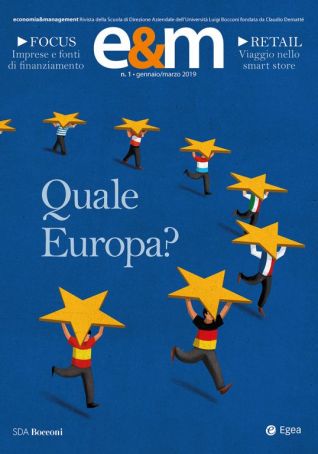
Dossier: Quale Europa?
Dossier: Scenario politico-istituzionale
Dossier: Capitali e mercati
Dossier: Imprese, persone e territori
Visual readings
Focus: Imprese e fonti di finanziamento
Speciale 30 anni di Economia & Management
2018/5
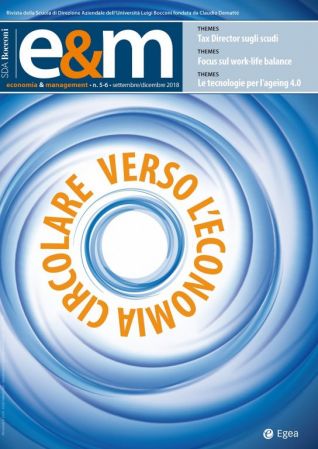
Dossier: Verso l’economia circolare
- Quale sviluppo sostenibile
- Che cos’è l’economia circolare
- Oltre l’economia lineare
- Politiche e strategie per cambiare paradigma
- Nuovi modelli di business made in Italy
- La Life Cycle Assessment per progettare il prodotto
- Le logiche di design for environment
- Logistica e sostenibilità: un binomio possibile
- Impatto sulla finanza: Risk, Revenue, Reputation
- La circolarità in pratica
- Ridisegnare il futuro per le imprese
Euroscenari
Moneta, finanza e regole
Themes
- Entrepreneurship in Established Firms
- Work-life balance, questione di cultura
- La sfida di essere mogli, madri e manager internazionali
- Creatività ed esecuzione nei team: le buone pratiche
- Tax Director sugli scudi
- PIR tra realtà e aspettative
- Verso un ageing 4.0 grazie alle tecnologie
- Il brand come piattaforma: il caso delle società di calcio
- Il settore vitivinicolo siciliano tra potenzialità e limiti
2018/4
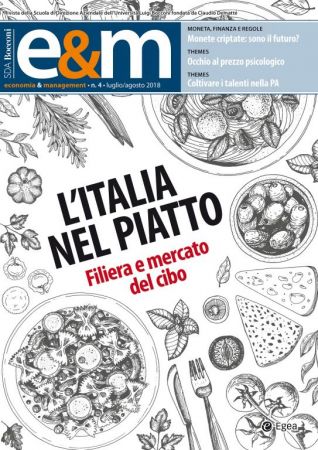
Editoriale
Dossier: L’Italia nel piatto
- L’Italia nel piatto
- Agribusiness: sfide e opportunità
- Campi in città
- Tutti in filiera
- Industria alimentare: stato dell’arte
- Foodtech: innovazione nella tradizione
- Quale supply chain
- L’importanza di essere premium
- L’esperienza prima di tutto
- La scelta dei GAS
- Il brand Made in Italy
- E lo chef diventa marca
Moneta, finanza e regole
Euroscenari
2018/3
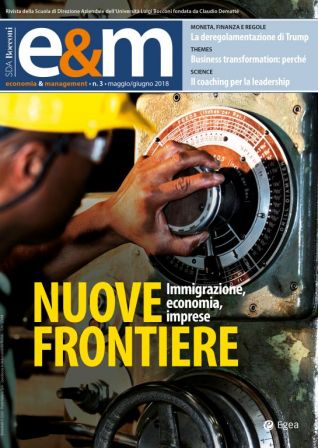
Dossier: Nuove frontiere. Immigrazione, economia, imprese
- L’integrazione (mancata) nel mercato del lavoro
- La parola d’ordine è governare i flussi
- L’immigrazione vista da imprese e sindacati
- Lavoratori immigrati preziosi per il welfare
- Le sfide per il sistema sanitario
- Il fenomeno virtuoso dell’imprenditorialità
- Mentoring come opportunità di crescita professionale
- I consumi dei Nuovi Italiani
- Nei media impera la paura
Euroscenari
Moneta, finanza e regole
2018/2
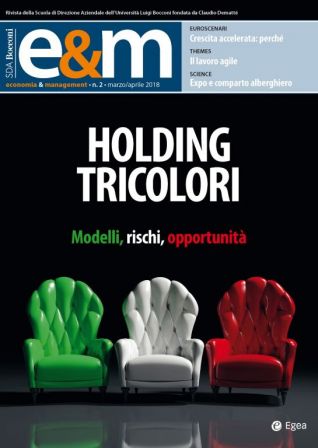
Dossier: Holding tricolori. Modelli, rischi, opportunità
Euroscenari
Moneta, finanza e regole
Science
2018/1
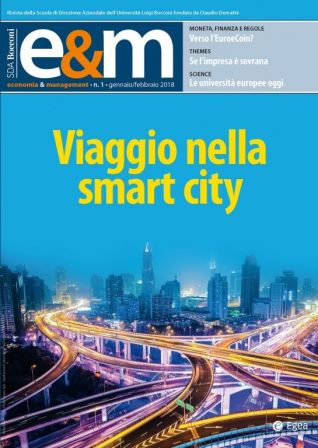
Editoriale
Dossier: Viaggio nella smart city
- Smart e green city: il futuro e le sfide manageriali
- Sostenibilità e inclusività le parole d’ordine
- Il ruolo delle istituzioni pubbliche nella governance
- Sharing platform e nuovi modelli di welfare
- L’intelligenza stratificata delle città italiane
- Milano, Monaco, Barcellona: ecosistemi a confronto
- Il cambiamento dalla città smart alla città sensibile
- Architettura e forestazione urbana
Euroscenari
Moneta, finanza e regole
Themes
2017/5
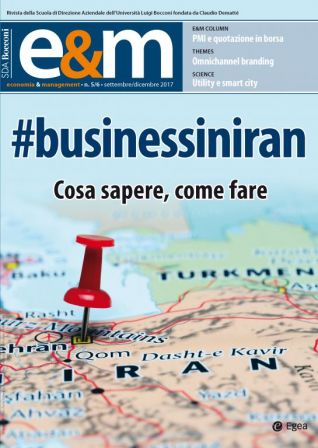
Editoriale
E&M Column
Dossier: #businessiniran. Cosa sapere, come fare
Moneta, finanza e regole
Euroscenari
Work & well-being
Themes
- L’intelligenza artificiale, agente invisibile in azienda
- More Characters, Better Twitter?
- Quanto valgono le società ICT in-house
- Omnichannel branding
- Pagamenti al dettaglio: situazione e prospettive FREE
- Mercato delle SPAC. Eppur si muove
- Do Institutional Investors Drive Corporate Social Responsibility?
2017/4
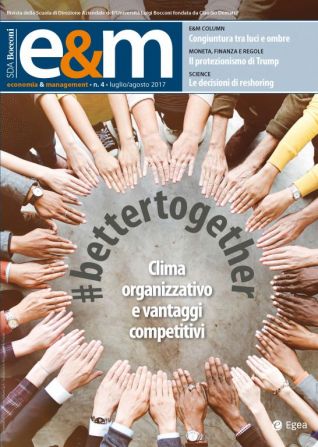
Editoriale
E&M Column
Dossier: #bettertogether. Clima organizzativo e vantaggi competitivi
Euroscenari
Moneta, finanza e regole
Themes
2017/3
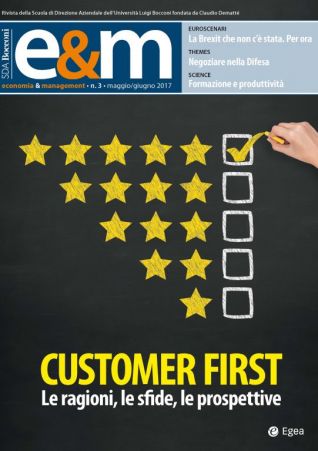
Editoriale
E&M Column
Dossier: Customer first. Le ragioni, le sfide, le prospettive
Moneta, finanza e regole
Euroscenari
Work & well-being
Themes
2017/2
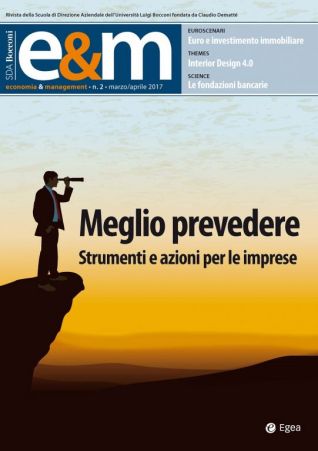
Editoriale
Dossier: Meglio prevedere. Strumenti e azioni per le imprese
Work & well-being
Moneta, finanza e regole
Themes
2017/1
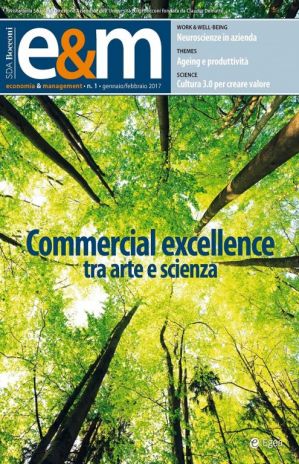
Editoriale
Dossier: Commercial excellence tra arte e scienza
Euroscenari
Moneta, finanza e regole
Work & well-being
2016/5
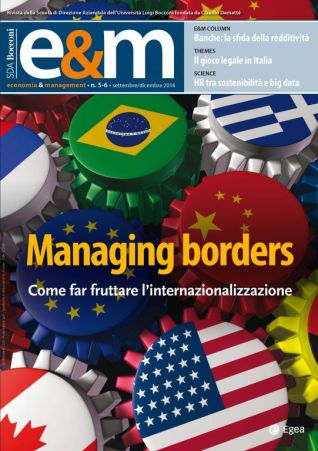
Editoriale
Dossier: Managing borders
Moneta, finanza e regole
Euroscenari
I costi della burocrazia
Themes
- Produttività: innovare tanto, innovare tutti. Dialogo con Marcello Messori
- Al passo con le Fintech
- Il gioco legale in Italia. Una scommessa da vincere
- Trasformarsi per competere
- Londra chiama Francoforte risponde
- Creare valore con gli add-on
- Luci e ombre dell’enterprise risk management in Italia
- Il valore dei dati nel manufacturing
- Una road map digitale per le imprese
2016/4

Editoriale
Dossier
Moneta, finanza e regole
Euroscenari
I costi della burocrazia
Themes
2016/3
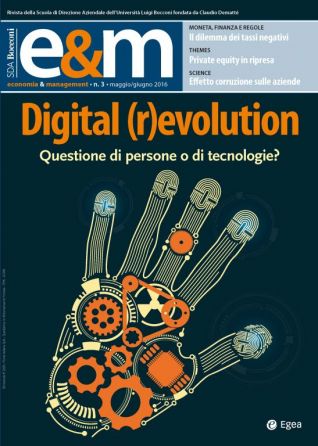
Editoriale
Dossier: Digital (r)evolution
I costi della burocrazia
Euroscenari
Moneta, finanza e regole
Themes
2016/2
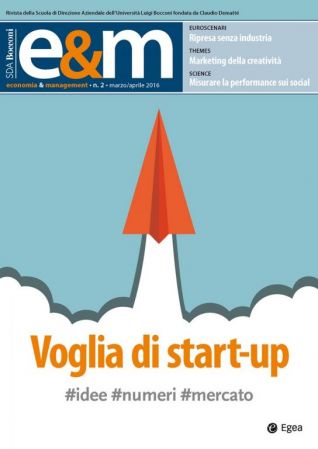
Dossier: Voglia di start-up
Euroscenari
Moneta, finanza e regole
I costi della burocrazia
Themes
2016/1
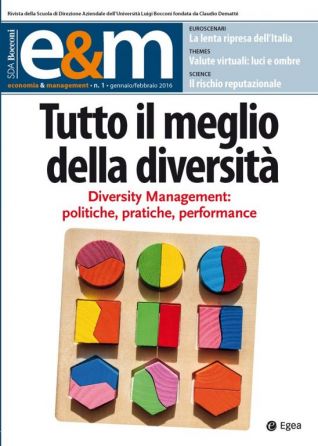
Editoriale
Dossier: Tutto il meglio della diversità
Euroscenari
Moneta, finanza e regole
I costi della burocrazia
Science
2015/6
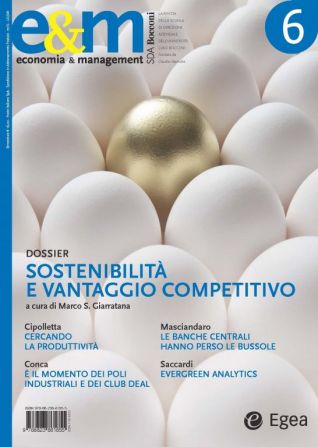
Dossier
- Il successo economico attraverso la sostenibilità e la sfida strategica delle aziende ibride. Un’introduzione
- Verso l’impresa sostenibile: la sperimentazione per innovare il modello d’impresa
- Gli incubatori sociali in Italia
- Perché la sfida ambientale ci chiede di reinventare l’impresa
- Lo sviluppo della moda sostenibile: one size doesn’t fit all
- Il Sustainable ROI. Misurare il ritorno degli investimenti in sostenibilità nel welfare dipendenti
Moneta, finanza e regole
Euroscenari
Il Diversity Management
Il mercato del Private Equity e degli LBO
Numbers
Imprenditori e Imprese
Letti per me
2015/5
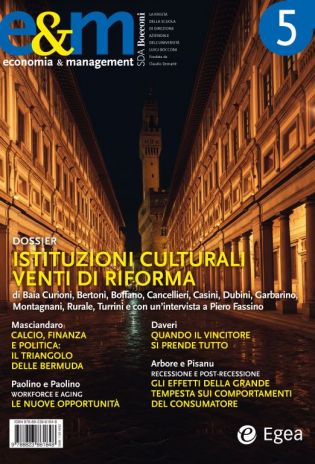
Editoriale
Dossier: istituzioni culturali, venti di riforma
- La riforma e i misteri. Sul destino dei musei statali in Italia
- Identità culturale e crescita di una città. Intervista a Piero Fassino, sindaco di Torino
- Sense and Sensibility. Gestire i beni culturali anche secondo principi aziendali: l’esperienza del FAI
- Cultural factory fra iconicità e management: un benchmarking europeo
- Festival in cerca di (diritto d’) autore
- La variabile fiscale nella gestione dei progetti artistico-culturali
Moneta, finanza e regole
Euroscenari
Il Diversity Management
Imprenditori & imprese
Letti per me
Focus forum
2015/4
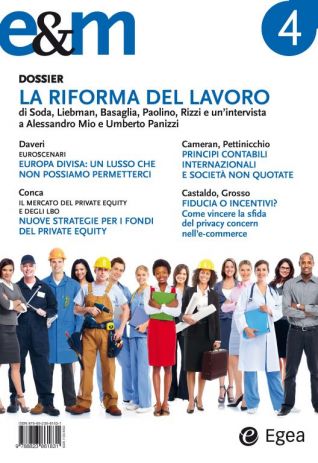
Editoriale
Dossier: La riforma del lavoro
- Il Jobs Act e l'evoluzione della disciplina dei licenziamenti in Italia
- Il downsizing nelle imprese europee tra il 2002 e il 2014
- La sicurezza dell’insicurezza: la nuova legge sul lavoro e gli impatti sul clima organizzativo
- Capitale umano comunque al centro. Intervista ad Alessandro Mio e Umberto Panizzi
Moneta, finanza e regole
Il Diversity Management
Il mercato del private equity e degli LBO
Imprenditori & imprese
Letti per me
2015/3
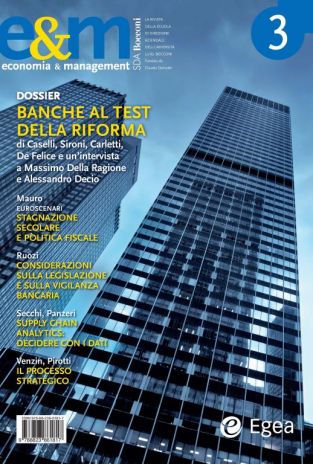
Dossier: banche al test della riforma
Moneta, finanza e regole
Euroscenari
Il Diversity Management
Imprenditori & imprese
Fotogrammi
Letti per me
2015/2
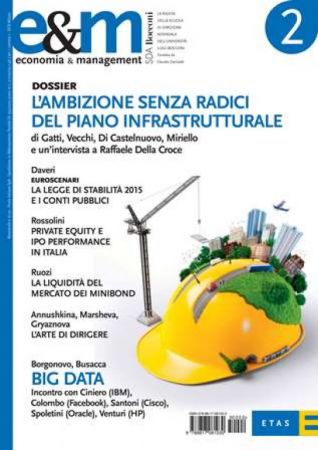
Dossier: l’ambizione senza radici del piano infrastrutturale
- Il PPP e l’attrazione dei capitali privati. Quali condizioni per colmare il funding gap?
- I nuovi assetti proprietari delle reti di trasporto energia in Europa
- Pension Funds’ Long Term Investment: A Huge Potential Demand. Interview with Mr. Raffaele Della Croce, Lead Manager, Long-term Investment Project, OECD
Moneta, finanza e regole
Il Diversity Management
Euroscenari
Il mercato del private equity e degli LBO
Imprenditori & imprese
2015/1
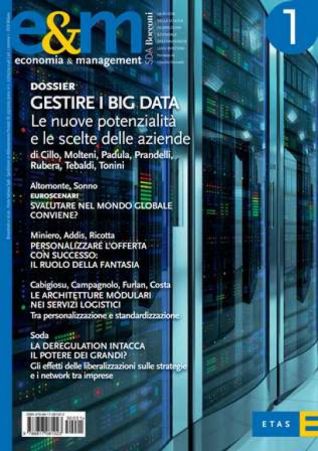
Dossier: gestire i Big Data
Moneta, finanza e regole
Il Diversity Management
Euroscenari
Articoli
Numbers
2014/6
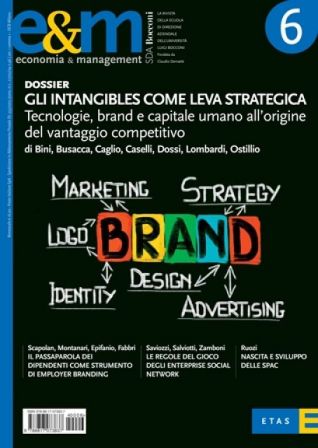
Dossier
- Gli intangibles come leva strategica. Tecnologie, brand e capitale umano all’origine
- La valutazione che non c’è
- L’impatto degli intangibili sul controllo di gestione
- La sfida della valutazione degli intangibles per le banche. Il tema critico delle scelte organizzative
- Brand Value Management. Come accrescere il valore della marca nel tempo
Moneta, finanza e regole
Il Diversity Management
Imprenditori & imprese
Il mercato del private equity e degli LBO
Articoli
Numbers
2014/5
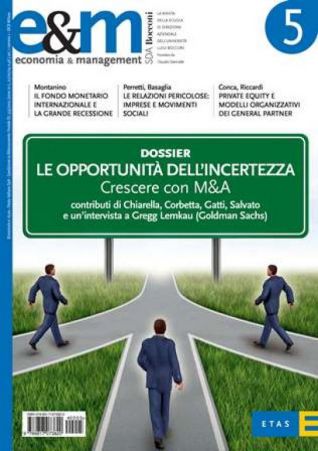
Dossier
Focus Forum
Moneta, finanza e regole
Il Diversity Management
Imprenditori e imprese
Articoli
2014/4
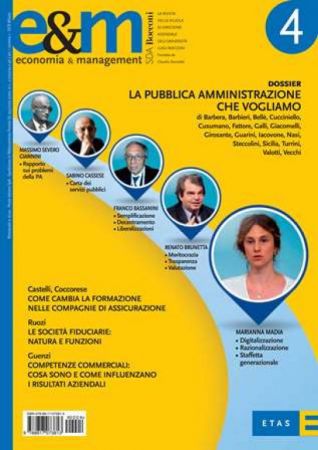
Dossier
- La PA che vogliamo. Un contributo di analisi e proposte
- Una PA da cambiare
- Bilancio e controlli oltre l’austerity
- Innovazione e agenda digitale: proposte per l’attuazione
- Le criticità italiane dell’agenda digitale
- Colmare i gap nella gestione dei servizi pubblici locali. Tre proposte
- Performance management
- Human resource management: elementi per una riforma
- La rivoluzione della PA con la PA è possibile. Intervista al ministro per la Semplificazione e la Pubblica Amministrazione, Marianna Madia
Moneta, finanza e regole
Il mercato del private equity e degli LBO
Articoli
Numbers
2014/3
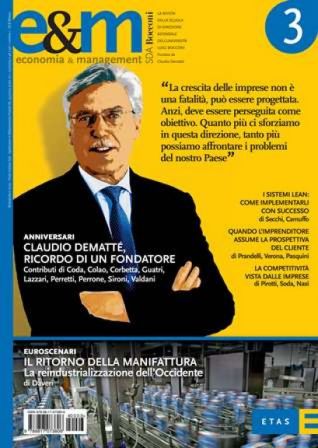
Moneta, finanza e regole
Il Diversity Management
Euroscenari
Imprenditori e imprese
Articoli
Numbers
2014/2
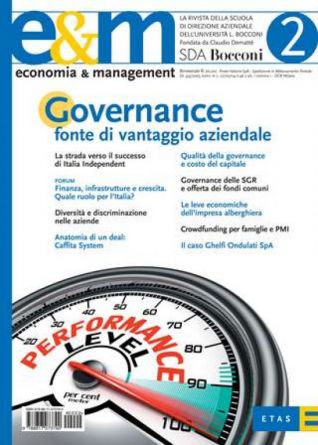
In primo piano
Fuoricampo
Moneta, finanza e regole
Il Diversity Management
Il mercato del private equity e degli LBO
Temi di management
Articoli
- Qualità della governance e costo del capitale di rischio. Un’analisi sul mercato italiano
- La governance delle SGR e l’offerta dei fondi comuni. Alcune considerazioni
- Come identificare e governare le leve economiche dell’impresa alberghiera
- Il crowdfunding e il finanziamento delle famiglie e delle PMI
Storie di straordinaria imprenditorialità
2014/1
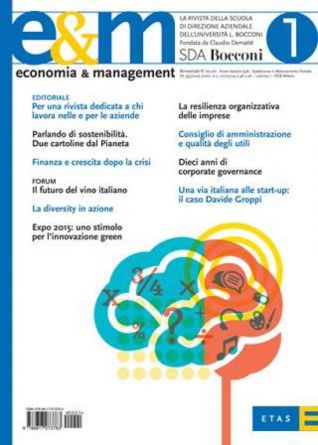
In primo piano
La finestra sul mondo
Moneta, finanza e regole
Il Diversity Management
Verso l'Expo
Fuoricampo
Articoli
Storie di straordinaria imprenditorialità
Fotogrammi
2013/6
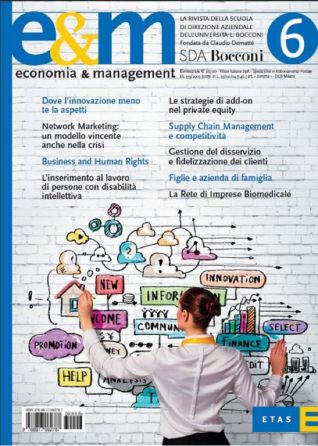
Editoriale
La finestra sul mondo
Moneta, finanza e regole
Il Diversity Management
Il mercato del private equity e degli LBO
Fuoricampo
Articoli
Storie di straordinaria imprenditorialità
2013/5
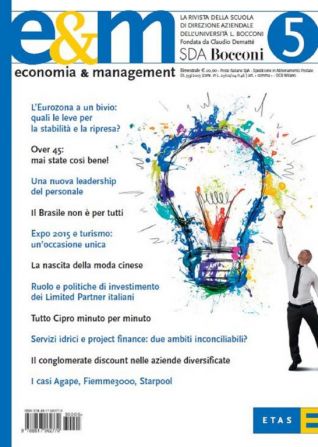
In primo piano
Focus forum
La finestra sul mondo
Moneta, finanza e regole
Fuoricampo
Articoli
Storie di straordinaria imprenditorialità
2013/4
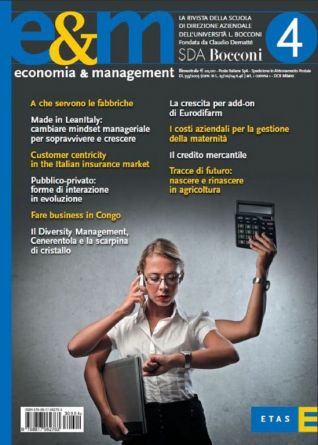
Editoriale
La finestra sul mondo
Moneta, finanza e regole
Il Diversity Management
Il mercato del private equity e degli LBO
Fuoricampo
Focus forum
Articoli
Storie di straordinaria imprenditorialità
2013/3
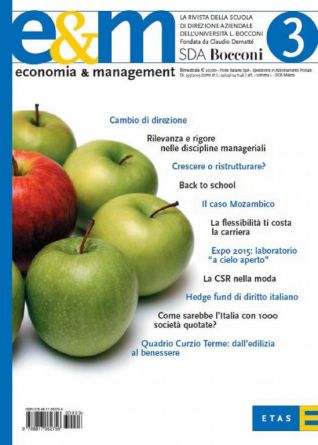
Editoriale
Rilevanza e rigore
Focus forum
La finestra sul mondo
Moneta, finanza e regole
Il Diversity Management
Temi di Management
Articoli
Fuoricampo
Storie di straordinaria imprenditorialità
2013/2
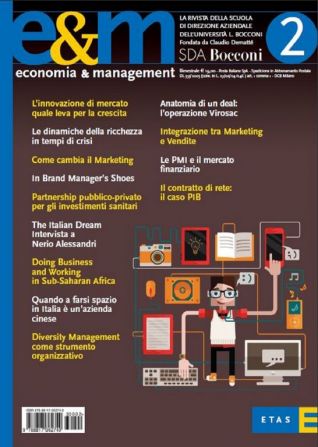
In primo piano
Focus forum
Il Diversity Management
La finestra sul mondo
Moneta, finanza e regole
Il mercato del private equity e degli LBO
Fuoricampo
Articoli
Storie di straordinaria imprenditorialità
2013/1
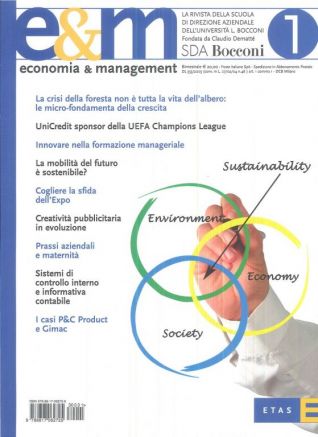
Editoriale
Focus forum
Moneta, finanza e regole
Verso l'Expo
Temi di Management
Fuoricampo
Articoli
- L’eccellenza della creatività pubblicitaria in evoluzione. Alcuni insegnamenti da diciotto anni di Cannes Award
- Sistemi di controllo interno e qualità dell’informativa contabile. Evidenze dalle principali società quotate europee
- Prassi aziendali e maternità. È possibile conciliare maternità e lavoro?
Storie di straordinaria imprenditorialità
Fotogrammi
2012/6
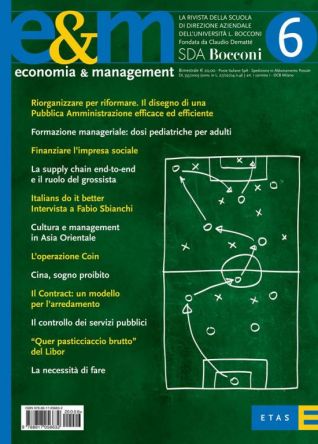
Forum
Temi di Management
La finestra sul mondo
Il mercato delle regole
Il mercato del private equity e degli LBO
Fuoricampo
Articoli
Storie di straordinaria imprenditorialità
2012/5
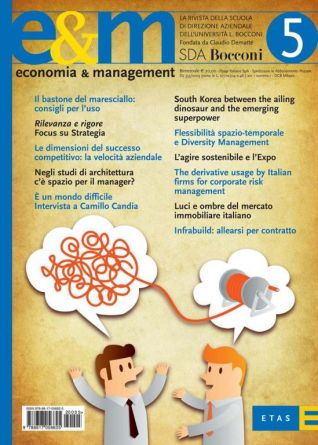
Rilevanza e rigore
Forum
Il Diversity Management
La finestra sul mondo
Il mercato delle regole
Fuoricampo
Temi di Management
Articoli
Storie di straordinaria imprenditorialità
2012/4
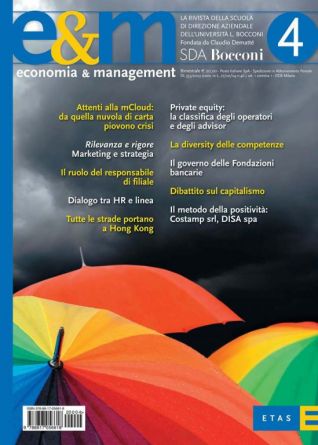
Rilevanza e rigore
Forum
La finestra sul mondo
Il mercato delle regole
Il mercato del privare equity e gli LBO
Fuoricampo
Il Diversity Management
Temi di Management
Articoli
Storie di straordinaria imprenditorialità
Fotogrammi
2012/3
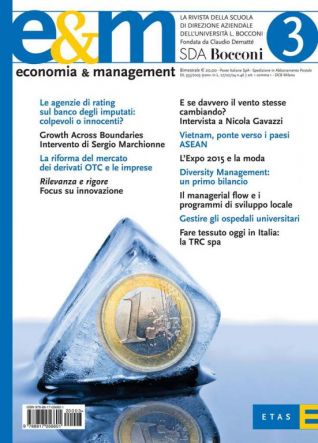
In primo piano
Rilevanza e rigore
Il mercato delle regole
Il Diversity Management
Fuoricampo
Articoli
Storie di straordinaria imprenditorialità
Fotogrammi
2012/2
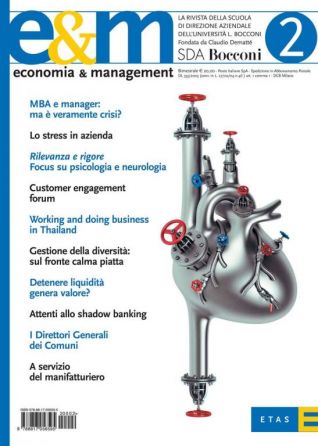
Editoriale
In primo piano
Rilevanza e rigore
- Lo spirito di Anassimandro e il dialogo tra impresa e ricerca nel management
- Il PhD in Business Administration and Management dell’Università Bocconi
- The Cognitive and Neuropsychological Foundations of Strategic Decision-Making
- A Glance at the Future. The Effects of Anticipated Disclosure of Concept Products on Consumer Evaluation of Marketed Products
La finestra sul mondo
Il Diversity Management
Temi di Management
Il mercato delle regole
Fuoricampo
Articoli
Storie di straordinaria imprenditorialità
2012/1
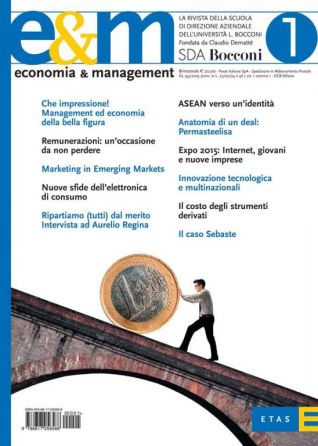
Forum
La finestra sul mondo
Il mercato delle regole
Il mercato del private equity e degli LBO
Fuoricampo
Temi di Management
Articoli
Storie di straordinaria imprenditorialità
Fotogrammi
2011/6
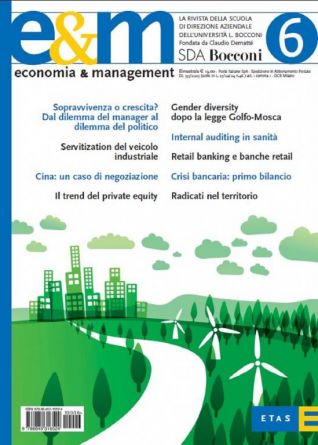
Focus forum
La finestra sul mondo
Il mercato delle regole
Il mercato del private equity e degli LBO
Il Diversity Management
Temi di Management
Fuoricampo
Articoli
Storie di straordinaria imprenditorialità
2011/5
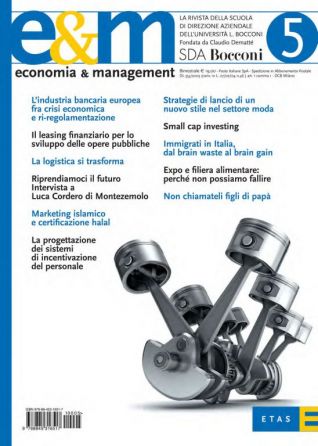
Focus forum
Focus intervista
La finestra sul mondo
Temi di management
Articoli
Il mercato delle regole
Il Diversity Management
Fuoricampo
Storie di ordinaria imprenditorialità
2011/4
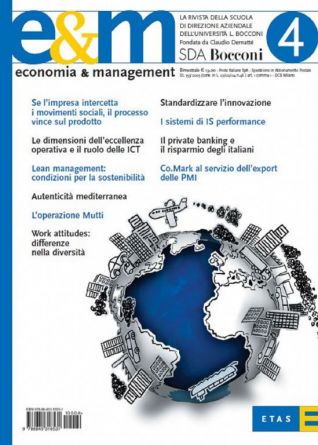
Focus forum
La finestra sul mondo
Il mercato delle regole
Il mercato del private equity e degli LBO
Il Diversity Management
Temi di Management
- Formazione e ricerca internazionale sul channel marketing & retail management
- Il punto di vendita: una piattaforma relazionale da reinventare
- National brand vs. Retail brand: chi vince la sfida per le preferenze degli acquirenti?
- Transfer pricing: un’opportunità per i gruppi multinazionali
- Tax Department: centro di costo o centro di profitto?
- Imprenditorialità interna: una ricerca empirica
- Stimolare l’imprenditorialità all’interno delle aziende complesse
Fuoricampo
Articoli
Storie di straordinaria imprenditorialità
2011/3
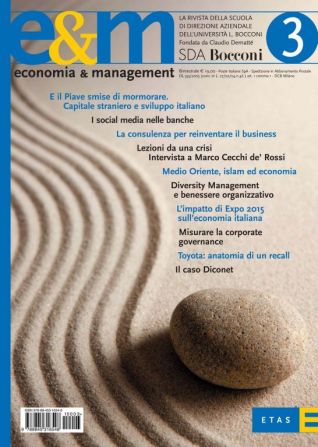
Focus forum
La finestra sul mondo
Il mercato delle regole
Il Diversity Management
Temi di Management
Fuoricampo
Articoli
Storie di straordinaria imprenditorialità
Fotogrammi
2011/2
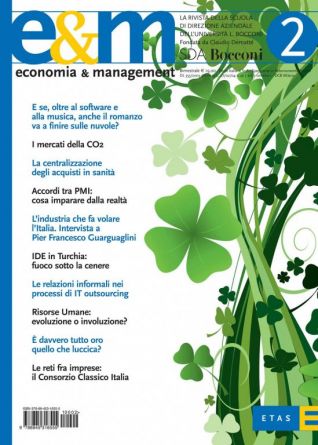
Focus intervista
La finestra sul mondo
Il mercato delle regole
Fuoricampo
Temi di Management
Articoli
Storie di straordinaria imprenditorialità
Fotogrammi
2011/1
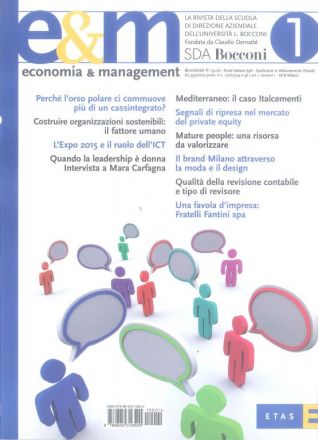
Editoriale
In primo piano
Focus intervista
La finestra sul mondo
Il mercato delle regole
Il mercato del private equity e degli LBO
Il Diversity Management
Temi di Management
Fuoricampo
Articoli
Storie di ordinaria imprenditorialità
Fotogrammi
2010/6
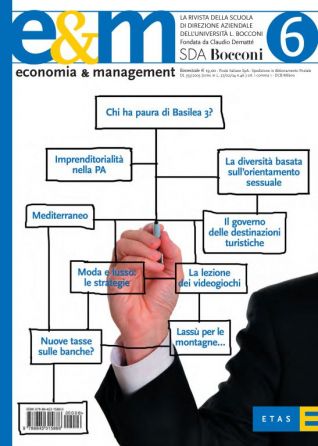
Editoriale
La finestra sul mondo
Il mercato delle regole
Il Diversity Management
Temi di management
Fuoricampo
Articoli
Storie di straordinaria imprenditorialità
Fotogrammi
2010/5
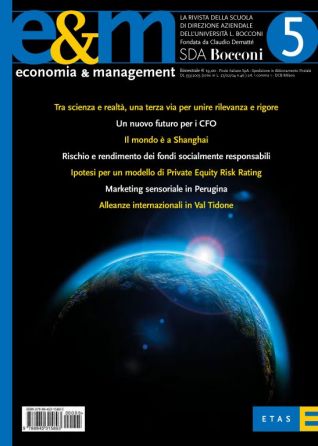
La finestra sul mondo
Il mercato delle regole
Fuoricampo
Temi di management
Articoli
Storie di straordinaria imprenditorialità
Fotogrammi
2010/4
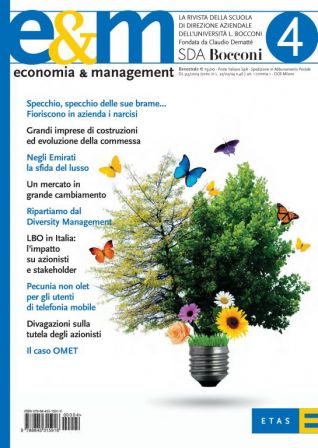
La finestra sul mondo
Il Diversity Management
Il mercato delle regole
Il mercato del private equity e degli LBO
Temi di Management
Fuoricampo
Articoli
Storie di straordinaria imprenditorialità
Fotogrammi
2010/3
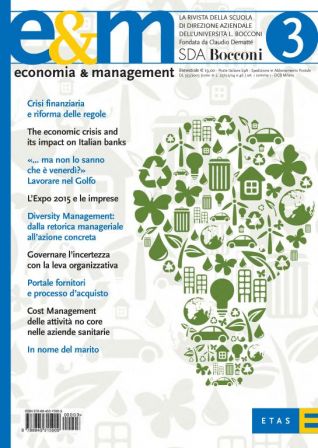
Editoriale
Focus forum
La finestra sul mondo
Verso l'Expo
Il Diversity Management
Il mercato delle regole
Temi di Management
- Impairment nei bilanci 2006-2008. Survey su un campione di 106 gruppi europei
- Pianificare in un mondo imprevedibile: dalle previsioni di sistema al budget di azienda
- Osservatorio Business Intelligence di SDA Bocconi: attività 2010
- IS Performance Management e IS Relationship Management
- Innovare attraverso la dematerializzazione: equilibrio tra compliance normativa, efficienza e competitività
Fuoricampo
Articoli
- Governare l’incertezza con la leva organizzativa. Una riflessione su modalità innovative di utilizzo coordinato di strumenti manageriali tradizionali
- Impatto del portale fornitori sul processo d’acquisto. I risultati di alcuni casi di implementazione
- Il cost management delle attività no core nelle aziende sanitarie
Storie di straordinaria imprenditorialità
Fotogrammi
2010/2
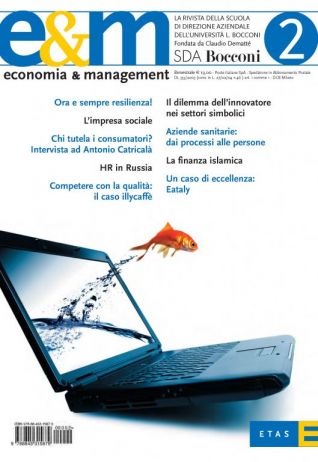
Editoriale
Focus intervista
La finestra sul mondo
Il mercato delle regole
Temi di Management
Fuoricampo
Articoli
Storie di straordinaria imprenditorialità
Fotogrammi
2010/1
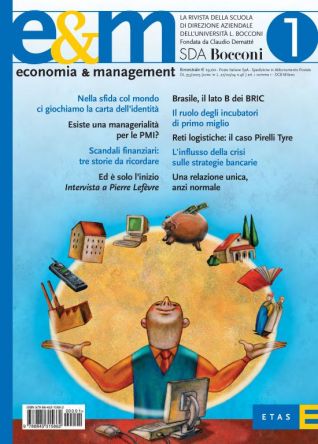
Focus intervista
Fuoricampo
La finestra sul mondo
Moneta, finanza e regole
Temi di Management
Articoli
Storie di straordinaria imprenditorialità
Fotogrammi
2009/6
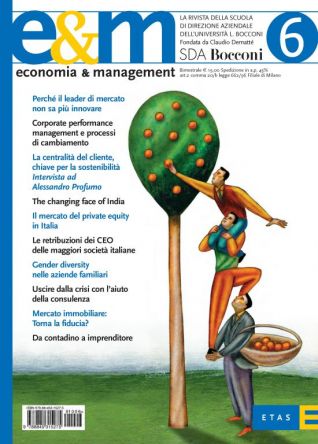
Focus forum
Focus intervista
La finestra sul mondo
Il mercato delle regole
Il mercato del private equity e degli LBO
Fuoricampo
Articoli
- Le retribuzioni dei CEO delle maggiori società italiane: equità e competitività
- La gender diversity nelle aziende familiari italiane. Una risorsa da valorizzare
- Uscire dalla crisi. La consulenza può aiutare le imprese?
- Mercato immobiliare: torna la fiducia? Cruciale per la ripresa l’azione delle banche
Storie di straordinaria imprenditorialità
Fotogrammi
2009/5
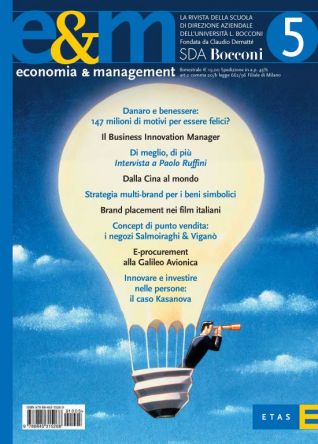
Focus intervista
La finestra sul mondo
Il mercato delle regole
Temi di Management
Fuoricampo
Articoli
- Strategia multi-brand per i beni simbolici. Le condizioni di successo nel lungo periodo
- Il brand placement: strategia e opportunità nei film italiani
- La pianificazione del concept di punto vendita. Dall’approccio tecnico a quello strategico
- Come adottare i sistemi di e-procurement in imprese di media-grande dimensione: il caso Galileo Avionica SpA
Storie di straordinaria imprenditorialità
Fotogrammi
2009/4
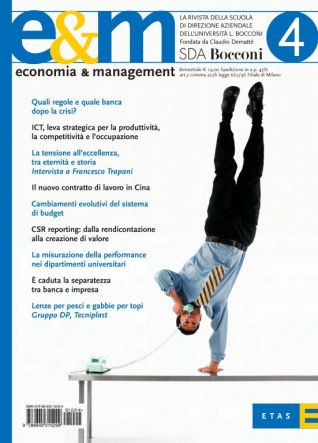
Doing business in China
Il mercato delle regole
Temi di Management
Articoli
Fuoricampo
Storie di straordinaria imprenditorialità
Fotogrammi
2009/3
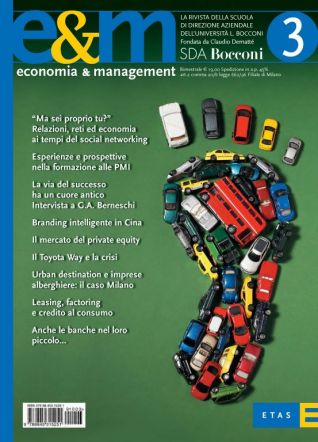
Doing business in China
Il mercato delle regole
Il mercato del private equity e degli LBO
Temi di Management
Fuoricampo
Articoli
- Il Toyota Way e la crisi. Tornare alle origini del lean management per sopravvivere e prosperare
- Posizionamento competitivo delle urban destination e performance delle imprese alberghiere: il caso Milano
- Leasing, factoring e credito al consumo. Caratteristiche settoriali e performance degli intermediari finanziari
Storie di straordinaria imprenditorialità
Fotogrammi
2009/2
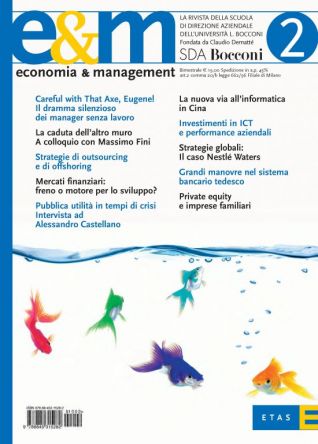
Focus forum
Focus intervista
Doing business in China
Il mercato delle regole
Fuoricampo
Articoli
- Investimenti in ICT e performance aziendali. Un’analisi delle strategie di implementazione ottimali
- Strategie globali e misurazione delle performance: il caso Nestlé Waters
- Grandi manovre nel sistema bancario tedesco
- L’impatto dei private equity sulle performance delle imprese familiari: il caso italiano
Storie di straordinaria imprenditorialità
Fotogrammi
2009/1
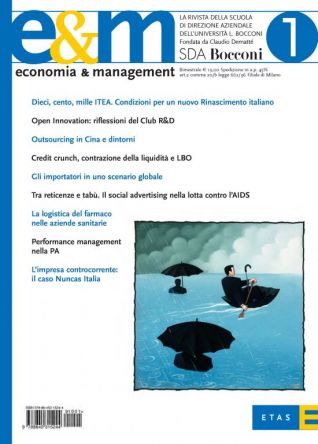
Focus forum
Doing business in China
Il mercato delle regole
Temi di Management
Fuoricampo
Articoli
- Credit crunch, contrazione della liquidità e LBO: quali cambiamenti nel mercato del leveraged finance
- Il ruolo degli importatori in uno scenario globale. Il caso degli elettrodomestici di largo consumo
- Tra reticenze e tabù. Social advertising e prevenzione della trasmissione sessuale dell’HIV in Italia
- La logistica del farmaco nelle aziende sanitarie. Prassi innovative e opportunità di collaborazione con gli altri attori della filiera
- Performance Management nella Pubblica Amministrazione. Criticità, esperienze e condizioni di efficace applicazione
Storie di straordinaria imprenditorialità
Fotogrammi
2008/6
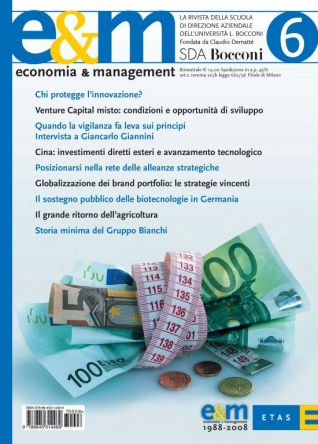
Editoriale
Focus intervista
Doing business in China
Il mercato delle regole
Fuoricampo
Articoli
Storie di straordinaria imprenditorialità
Fotogrammi
2008/5
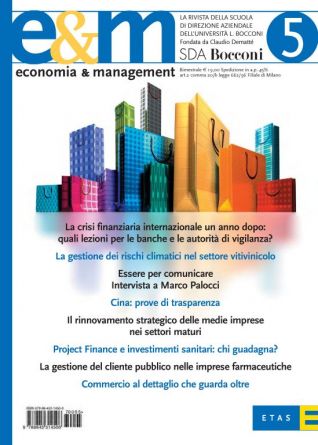
Focus forum
Focus intervista
Doing business in China
Il mercato delle regole
Temi di Management
Fuoricampo
Articoli
Storie di straordinaria imprenditorialità
Fotogrammi
2008/4
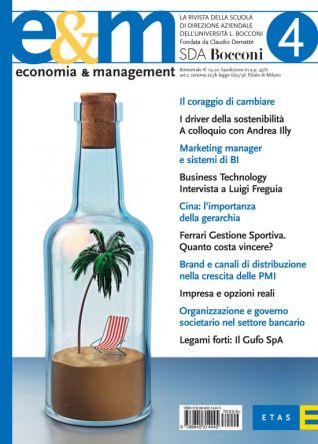
Editoriale
Focus intervista
Il mercato delle regole
Doing business in China
Temi di Management
Fuoricampo
Articoli
- Quanto costa vincere? Il controllo dei costi in Ferrari Gestione Sportiva
- Comunicare l’innovazione per creare valore. Il ruolo del brand e dei canali di distribuzione nella crescita delle PMI
- Valutazione dell’impresa e opzioni reali: la visione “estesa” del bilancio
- Banche: organizzazione e governo societario secondo Banca d’Italia
Storie di straordinaria imprenditorialità
Fotogrammi
2008/3
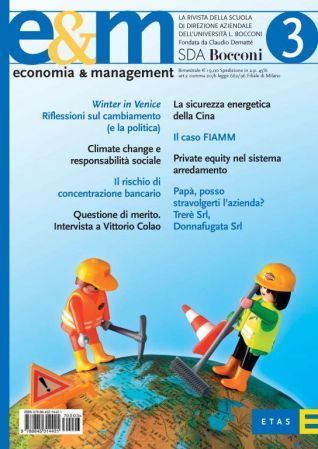
Focus intervista
Doing business in China
Temi di Management
- L’eccellenza nei processi di produzione International Best Factory Award 2007
- L’eccellenza nei processi di innovazione aziendali Best Innovation Award 2007
- I sistemi di BI in Italia: prime evidenze dell’Osservatorio SDA Bocconi
- Sistemi informativi integrati e Web 2.0: dal make al buy al mash-up delle applicazioni software?
Il mercato delle regole
Fuoricampo
Articoli
Storie di straordinaria imprenditorialità
Fotogrammi
2008/2
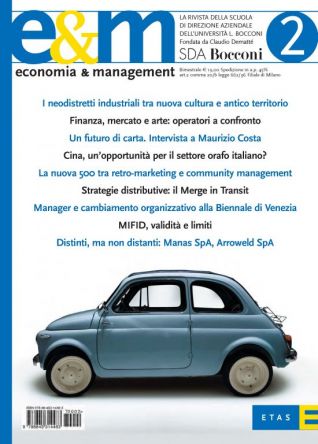
Focus forum
Focus intervista
Il mercato delle regole
Doing business in China
Fuoricampo
Articoli
Storie di straordinaria imprenditorialità
Fotogrammi
2008/1
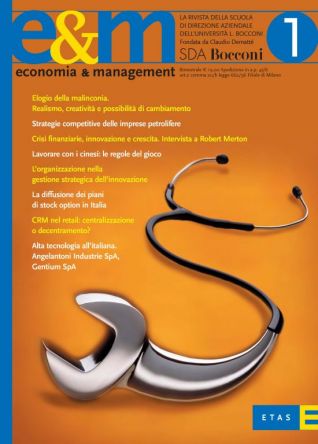
Il mercato delle regole
Doing business in China
Temi di Management
Fuoricampo
Articoli
Storie di straordinaria imprenditorialità
Fotogrammi
2007/6
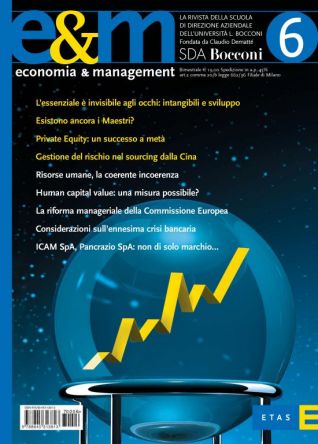
Il mercato delle regole
Doing business in China
Temi di Management
- Non bastano i tagli alla spesa: occorre rinnovare la classe dirigente pubblica italiana
- Sistemi contabili pubblici a un bivio: come cogliere un’occasione di rinnovamento
- Lo stato di attuazione dell’e-government negli enti locali italiani: tra retorica e realtà
- Nuove opportunità: l’immersione nelle esperienze di consumo
Fuoricampo
Articoli
Storie di straordinaria imprenditorialità
Fotogrammi
2007/5
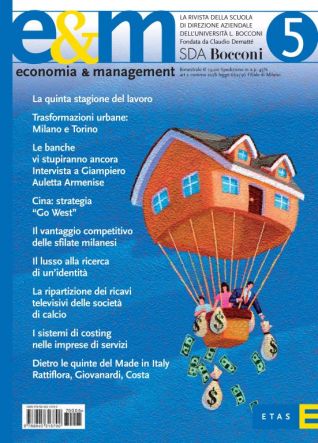
Editoriale
Focus intervista
Doing business in China
Il mercato delle regole
Temi di Management
Fuoricampo
Articoli
Storie di straordinaria imprenditorialità
Fotogrammi
2007/4
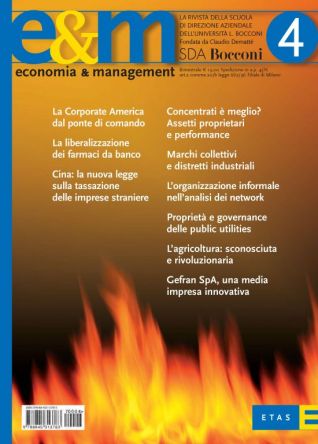
Doing business in China
Il mercato delle regole
Fuoricampo
Articoli
- Concentrati è meglio? Assetti proprietari e performance: un’indagine empirica
- I marchi collettivi: un’opportunità per il rilancio dei distretti industriali
- Proprietà e corporate governance delle public utilities. Tra autonomia di impresa e tutela dell’interesse pubblico
- L’organizzazione informale nella prospettiva dell’analisi dei Network
- L’agricoltura: sconosciuta e rivoluzionaria
Storie di straordinaria imprenditorialità
Fotogrammi
2007/3
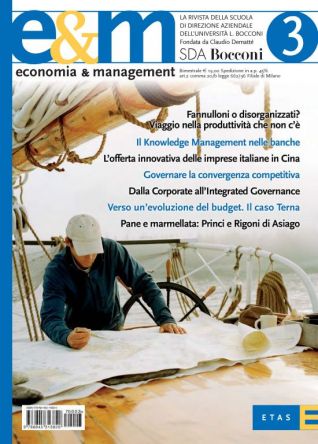
Focus forum
Doing business in China
Il mercato delle regole
Temi di Management
Fuoricampo
Articoli
Storie di straordinaria imprenditorialità
Fotogrammi
2007/2
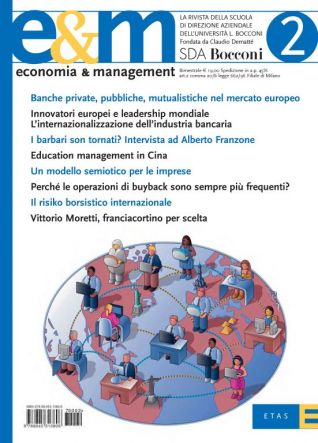
Focus intervista
Doing business in China
Il mercato delle regole
Temi di Management
Fuoricampo
Articoli
Storie di straordinaria imprenditorialità
Fotogrammi
2007/1
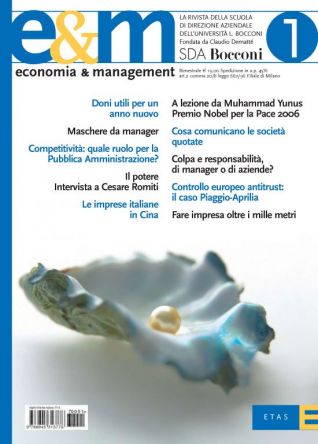
Focus intervista
Doing business in China
Il mercato delle regole
Temi di Management
Fuoricampo
Articoli
- La lotta alla povertà passa per la microfinanza. A lezione da Muhammad Yunus, Premio Nobel per la Pace 2006
- Corporate governance e assessment del sistema di controllo interno: cosa comunicano le società quotate?
- Colpa e responsabilità, di manager o di aziende? Modelli organizzativi, procedure e standard di controllo ex D.lgs. 231
- Il controllo europeo antitrust delle concentrazioni: il caso Piaggio-Aprilia
Storie di straordinaria imprenditorialità
Fotogrammi
2006/6
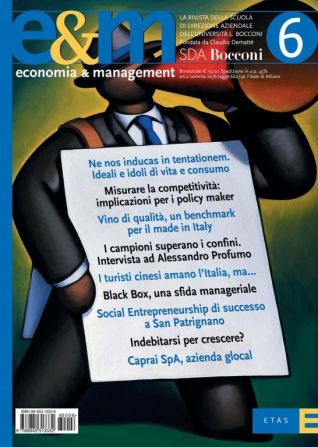
Editoriale
Focus intervista
Il mercato delle regole
Doing business in China
Area Pubblica Amministrazione
Area Amministrazione e Controllo
Fuoricampo
Articoli
Storie di straordinaria imprenditorialità
Fotogrammi
2006/5
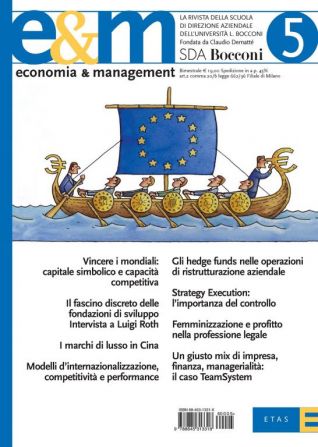
Doing business in China
Il mercato delle regole
Area Metodi Quantitativi
Fuoricampo
Articoli
- Modelli d’internazionalizzazione, competitività e performance delle imprese
- Il ruolo degli hedge funds nelle operazioni di corporate restructuring
- Strategy execution: l’importanza di controllare la realizzazione della strategia
- L’esercito di riserva: femminizzazione e profitto nella professione legale inglese
Storie di straordinaria imprenditorialità
Fotogrammi
2006/4
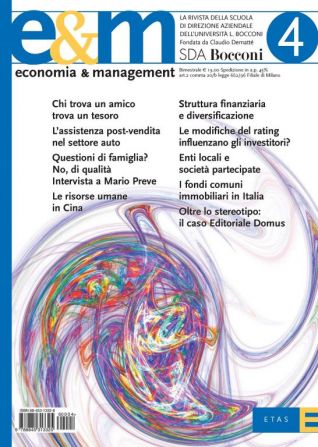
Editoriale
La tribuna dei lettori
Focus forum
Focus intervista
Doing business in China
Il mercato delle regole
Area Finanza Aziendale e Immobiliare
Fuoricampo
Articoli
- Struttura finanziaria e scelte strategiche di diversificazione. L’esperienza italiana (1980-2000)
- Le modifiche del rating influenzano il comportamento degli investitori?
- Enti locali e società partecipate: quale controllo per i servizi pubblici
- Attualità e problemi dei fondi comuni immobiliari in Italia
Storie di straordinaria imprenditorialità
Fotogrammi
2006/3
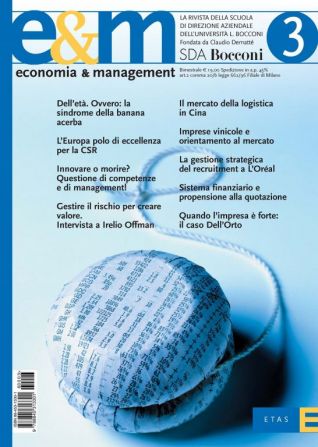
Articoli
La tribuna dei lettori
Focus intervista
Doing business in China
Il mercato delle regole
Fuoricampo
Articoli
Storie di straordinaria imprenditorialità
Fotogrammi
2006/2
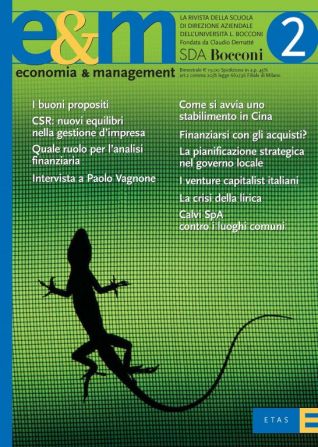
Editoriale
La tribuna dei lettori
Articoli
Focus forum
Focus intervista
Doing business in China
Il mercato delle regole
Area organizzazione personale
Area Pubblica Amministrazione
Fuoricampo
Articoli
Storie di straordinaria imprenditorialità
Fotogrammi
2006/1
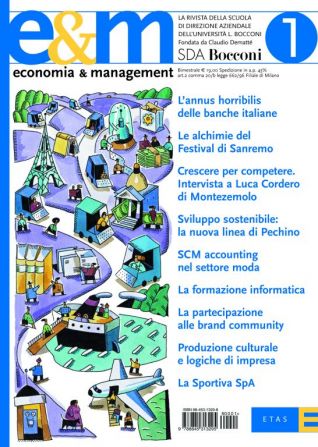
Focus intervista
Doing business in China
Che cosa pensano i leader
Il mercato delle regole
Area sistemi informativi
Area intermediazione finanziaria e assicurazioni
Fuoricampo
Articoli
- Controllare la Supply Chain nel settore moda: quale ruolo per il Management Accounting
- La formazione informatica: Cenerentola delle iniziative aziendali, ma “così fan tutti”
- La partecipazione alle Brand Community
- L’intrapresa culturale. Riflessioni sul rapporto tra produzione culturale e logiche di impresa
Storie di straordinaria imprenditorialità
Fotogrammi
2005/6
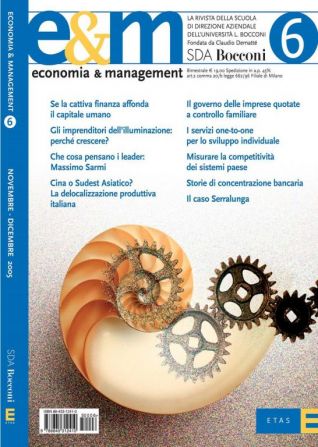
La tribuna dei lettori
Che cosa pensano i leader
Doing business in China
Il mercato delle regole
Fuoricampo
Articoli
- Il governo delle imprese italiane quotate a controllo familiare: i risultati di una ricerca esplorativa
- Oltre l’aula: i servizi one-to-one per lo sviluppo individuale. Counseling, mentoring, coaching, tutoring
- Misurare la competitività dei sistemi paese: il modello del World Economic Forum
- Quella che avrebbe dovuto essere una storia di concentrazione bancaria
Storie di straordinaria imprenditorialità
Fotogrammi
2005/5
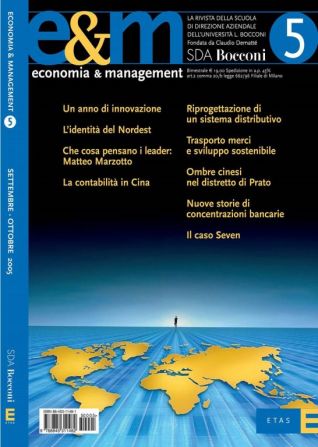
Editoriale
La tribuna dei lettori
Focus forum
Che cosa pensano i leader
Doing business in China
Il mercato delle regole
Area Amministrazione e Controllo
Area Pubblica Amministrazione
Area Strategia
Fuoricampo
Articoli
Storie di straordinaria imprenditorialità
Fotogrammi
2005/4
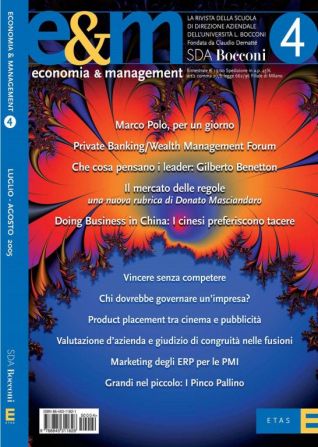
Editoriale
Focus forum
Che cosa pensano i leader
Il mercato delle regole
Doing business in China
Area Marketing
Fuoricampo
Articoli
- Vincere senza competere: l’innovazione di valore e la ricerca di nuovi, incontrastati spazi di mercato
- Chi dovrebbe governare un’impresa?
- Il product placement tra realismo cinematografico e comunicazione pubblicitaria
- Valutazione d’azienda e giudizio di congruità nelle fusioni: alcune evidenze empiriche
- Marketing degli ERP per le PMI: un’indagine empirica sui resellers italiani
Storie di straordinaria imprenditorialità
Fotogrammi
2005/3
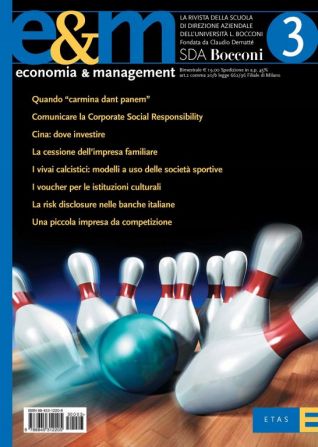
La tribuna dei lettori
Doing business in China
Area Metodi Quantitativi
Area Produzione e Tecnologia
Fuoricampo
Articoli
Storie di straordinaria imprenditorialità
Fotogrammi
2005/2
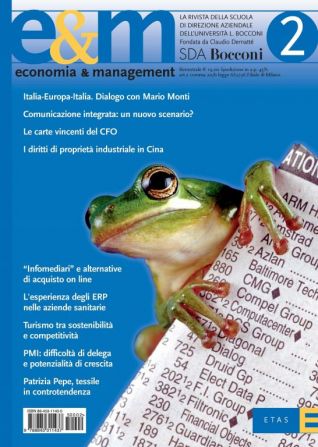
La tribuna dei lettori
Focus intervista
Doing business in China
Area Finanza aziendale e immobiliare
Area Pubblica Amministrazione
Fuoricampo
Articoli
Storie di straordinaria imprenditorialità
Fotogrammi
2005/1
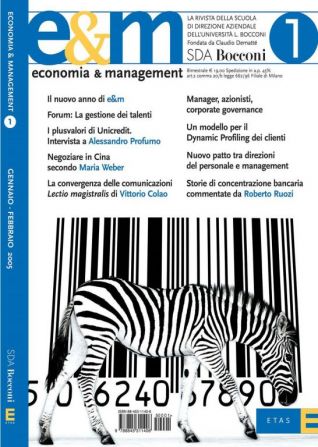
Editoriale
La tribuna dei lettori
Focus forum
Focus intervista
Doing business in China
Area Intermediazione finanziaria e Assicurazioni
Area Organizzazione e Personale
Fuoricampo
Articoli
- La convergenza delle comunicazioni: sfide vinte, sfide nuove
- La personalizzazione dell’offerta in ambienti digitali: un modello per il Dynamic Profiling dei clienti
- Manager e azionisti: evidenze empiriche e problemi aperti nella prospettiva della corporate governance
- La gestione strategica delle risorse umane: un nuovo patto tra direzione del personale e management
- Storie di concentrazione bancaria: la mancata fusione San Paolo-Dexia
Storie di straordinaria imprenditorialità
Fotogrammi
2004/6
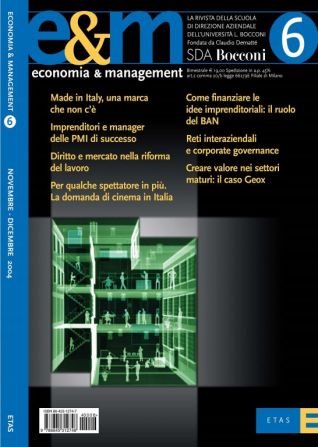
La tribuna dei lettori
Area Sistemi Informativi
Area Economia
Fuoricampo
Articoli
- Diritto e mercato nella riforma del lavoro: dal Libro bianco al d.lgs. 276 del 2003
- Per qualche spettatore in più. Un contributo conoscitivo sulla domanda di cinema in Italia
- Mercati informali e mercati delle “idee”. Il ruolo del Business Angels Network
- Reti interaziendali e corporate governance
- Crescere e creare valore nei settori maturi: il caso Geox
Fotogrammi
2004/5
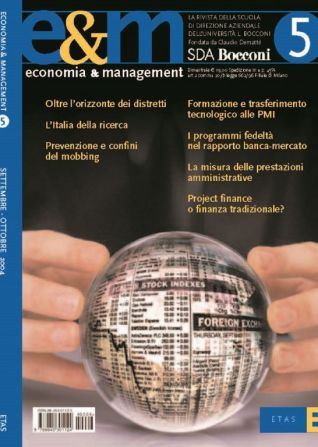
Editoriale
La tribuna dei lettori
Focus Manager allo specchio
Area Strategia
Area Pubblica Amministrazione
Fuoricampo
Articoli
- La formazione nei processi di trasferimento tecnologico alle PMI: la piattaforma e-learning Enea
- Le banche dalla parte del cliente. I programmi fedeltà nel rapporto banca-mercato
- La misura delle prestazioni delle attività amministrative: un’applicazione al sistema universitario italiano
- Investimenti pubblici: project finance o finanza tradizionale? Uno strumento per l’analisi della convenienza economica e finanziaria
Fotogrammi
2004/4
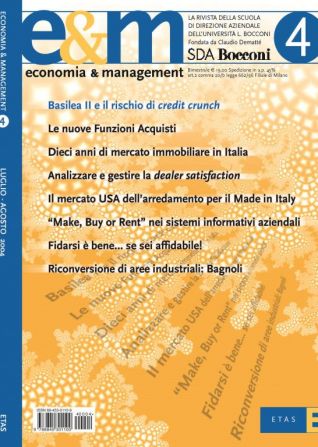
La tribuna dei lettori
Focus forum
Focus intervista
Area Amministrazione e Controllo
Area Marketing
Fuoricampo
Articoli
- Analizzare e gestire la dealer satisfaction: un’analisi empirica nel mercato degli orologi
- Il mercato USA dell’arredamento: quali opportunità e sfide per le aziende italiane di alta gamma?
- Dal “make or buy” al “make, buy or rent” nei sistemi informativi aziendali
- Fidarsi è bene… se sei affidabile! Cosa sono e come operano le organizzazioni ad alta affidabilità per ottenere alte prestazioni in “ambienti ostili”
- La riconversione di aree industriali, le società di trasformazione urbana e il caso Bagnolifutura
Fotogrammi
2004/3
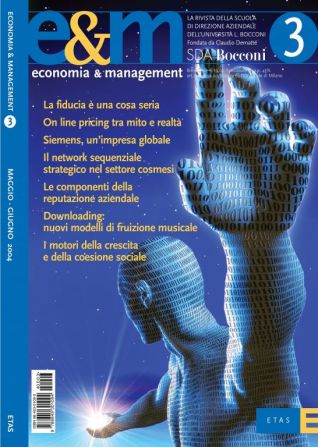
Editoriale
La tribuna dei lettori
Focus intervista
Area Intermediazione finanziaria e Assicurazioni
Area Produzione e Tecnologia
Fuoricampo
Articoli
- Il network sequenziale strategico nel settore della cosmesi: evidenze empiriche
- Le componenti della reputazione aziendale. Indicazioni dalla ricerca RQ Italy
- Downloading: sostituto o complemento del CD? Modelli innovativi della fruizione musicale
- Costruire la fiducia. L’università e la banca, motori di crescita e di coesione sociale
Fotogrammi
2004/2
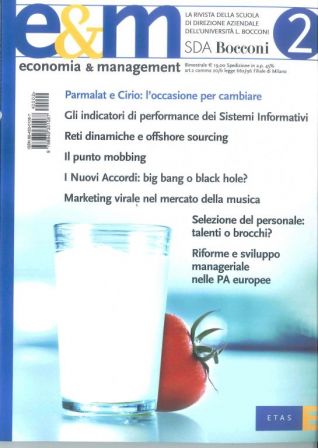
La tribuna dei lettori
Focus intervista
Focus Manager allo specchio
Area Pubblica Amministrazione
Area Finanza aziendale e immobiliare
Fuoricampo
Articoli
- I nuovi accordi sul rischio, sulla governance e sul capitale: big bang o black hole?
- Il marketing virale: esperienze e lezioni dal mercato musicale
- Riforme istituzionali e sviluppo manageriale delle PA: quali driver di cambiamento?
- Talenti o brocchi? La selezione del personale e le performance individuali
Fotogrammi
2004/1
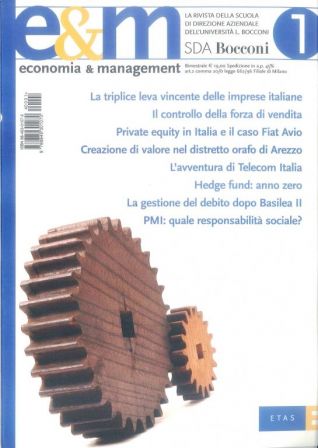
Editoriale
La tribuna dei lettori
Focus forum
Focus intervista
Area Metodi Quantitativi
Area Organizzazione e Personale
Fuoricampo
Articoli
2003/6
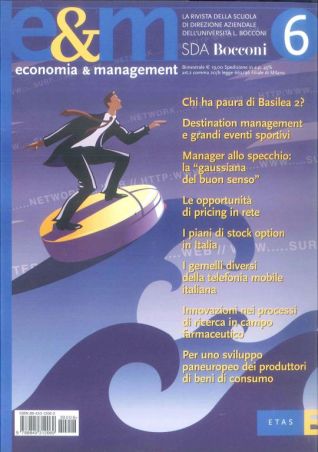
Editoriale
La tribuna dei lettori
Focus forum
Focus Manager allo specchio
Area Economia
Area Sistemi Informativi
Fuoricampo
Articoli
- Le opportunità per il pricing in rete
- I piani di stock option in Italia: diffusione e caratteristiche
- Gemelli diversi: rivalità competitiva nel settore della telefonia mobile italiana
- Innovazioni nei processi di ricerca in campo farmaceutico
- Quale strategia per lo sviluppo paneuropeo dei produttori di beni di consumo?
Fotogrammi
2003/5
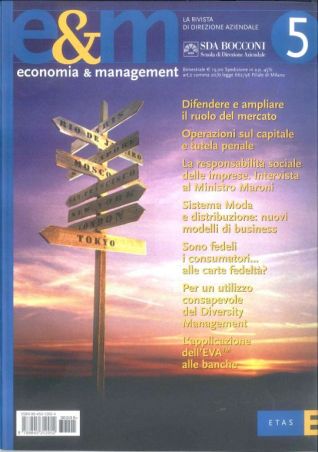
La tribuna dei lettori
Focus intervista
Area Strategia
Area Pubblica Amministrazione
Fuoricampo
Articoli
- La distribuzione nel sistema moda italiano: verso nuovi modelli di business
- Nuova sfida nel commercio al dettaglio: sono fedeli i consumatori… alle carte fedeltà?
- Uguali o diversi? Per un utilizzo consapevole del diversity management
- Creazione di valore e valutazione delle performance: l’applicazione dell’EVA™ alle banche
2003/4
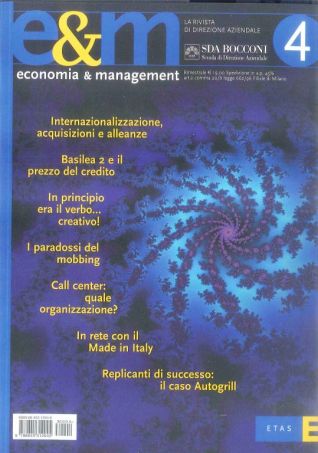
Editoriale
La tribuna dei lettori
Focus Manager allo specchio
Focus intervista
Area Marketing
Area Amministrazione e Controllo
Fuoricampo
Articoli
Fotogrammi
2003/3
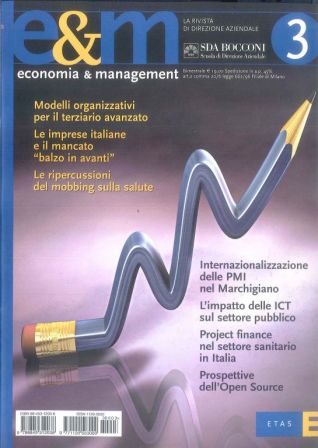
La tribuna dei lettori
Focus forum
Focus Manager allo specchio
Area Intermediazione finanziaria e Assicurazioni
Area Tecnologia
Fuoricampo
Articoli
- I processi di internazionalizzazione delle PMI. Un’analisi empirica sul contesto produttivo marchigiano
- Paradigmi e progetti di e-government: l’impatto delle ICT sul settore pubblico
- Il project finance nel settore sanitario. Stato dell’arte e prospettive in Italia
- Realtà e possibilità dell’open source
2003/2
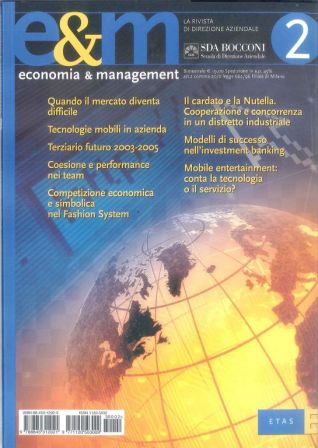
La tribuna dei lettori
Focus forum
Focus Terziario
Area Finanza aziendale e immobiliare
Area Pubblica Amministrazione
Fuoricampo
Articoli
- Attrazione pericolosa
- L’unione fa la forza? Coesione e performance nei team
- Servono alla moda italiana i gruppi multibusiness e multibrand?
- Competizione economica e competizione simbolica nel Fashion System
- Il cardato e la Nutella. Cooperazione e competizione tra le imprese di un distretto industriale
- Modelli di successo in un ambiente di investment banking in ridimensionamento
- Mobile entertainment: alla ricerca della miglior tecnologia o del miglior servizio?
Fotogrammi
2003/1
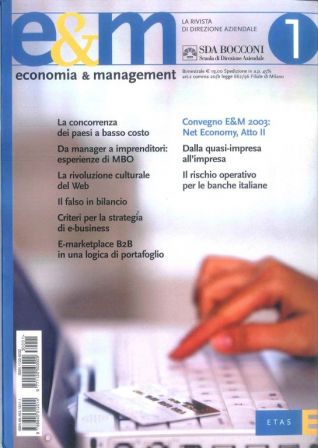
La tribuna dei lettori
Focus forum
Area Sistemi Informativi
Area Organizzazione e Personale
Fuoricampo
Articoli
- Il falso in bilancio. Osservazioni su alcuni riflessi del decreto legislativo 11 aprile 2002, n. 61, sul governo dell’azienda
- Criteri per la strategia di e-business
- E-marketplace B2B in una logica di portafoglio
- Net economy, atto II. Credibilità e sostenibilità da casi aziendali
- Dalla quasi-impresa all’impresa
- Il rischio operativo: una nuova sfida per le banche italiane
Fotogrammi
2002/6
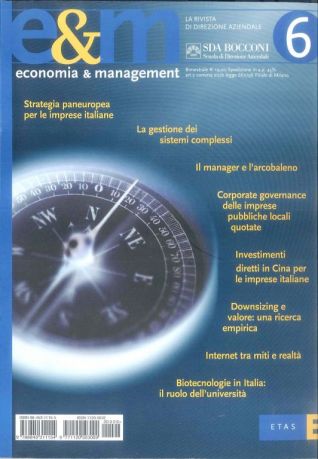
Focus intervista
Area Economia
Area Metodi Quantitativi
Area Strategia
Fuoricampo
Articoli
- Privatizzazioni e corporate governance. Il caso delle imprese pubbliche locali quotate
- Investimenti diretti esteri in Cina: quali modalità per le imprese italiane?
- Licenziamenti e valore: una ricerca empirica sulla relazione tra annunci di downsizing e quotazione azionaria
- Internet tra miti e realtà. Verifica di alcune regole della nuova economia
- Per lo sviluppo delle biotecnologie in Italia: il ruolo dell’università
2002/5
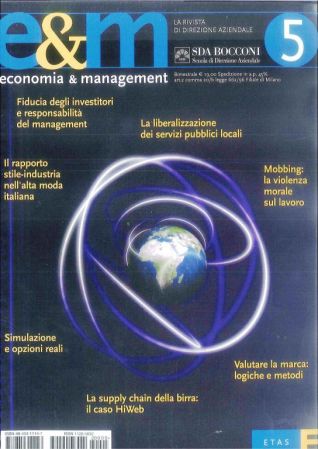
Focus Manager allo specchio
Area Amministrazione e Controllo
Fuoricampo
Articoli
- Il rapporto stile-industria: l’esperienza italiana nell’abbigliamento formale femminile di fascia alta
- Simulazione e opzioni reali per decisioni orientate al valore
- Dare un valore alla marca è possibile? Un confronto sulle logiche e sui metodi di valutazione. Riflessioni a margine di un panel di esperti
Management & dintorni
2002/4
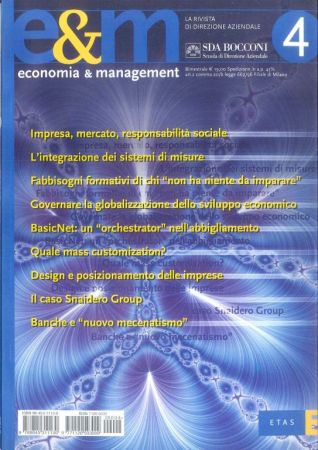
Focus forum
Focus intervista
Area Intermediazione finanziaria e Assicurazioni
Area Tecnologia
Fuoricampo
Articoli
- Come governare la globalizzazione dello sviluppo economico
- Un “orchestrator” nell’abbigliamento. Il caso Basicnet
- Quale mass customization? Strutture di prodotto e strategie di approvvigionamento
- Design e posizionamento delle imprese
- Noi, mediatori tra la creatività e il mercato
- L’approccio di relationship marketing nel sistema del valore dell’arredamento. Il caso Snaidero Group
- Impresa bancaria e cultura: il nuovo mecenatismo
Fotogrammi
Management & dintorni
2002/3
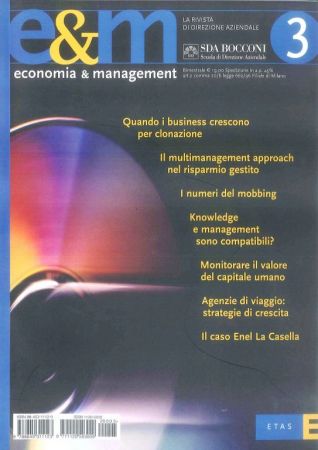
Focus forum
Focus Manager allo specchio
Area Finanza aziendale e immobiliare
Area Marketing
Fuoricampo
Articoli
Fotogrammi
Management & dintorni
2002/2
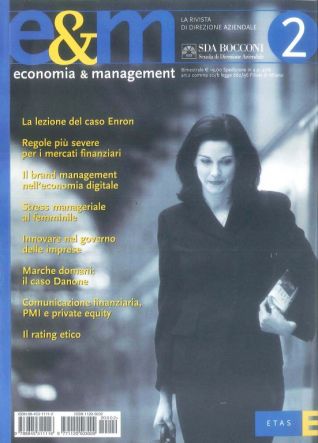
Editoriale
Focus Manager allo specchio
Area Amministrazioni pubbliche, Sanità E Non Profit
Area Sistemi informativi
Area Sistemi Informativi
Fuoricampo
Articoli
Fotogrammi
Management & dintorni
2002/1
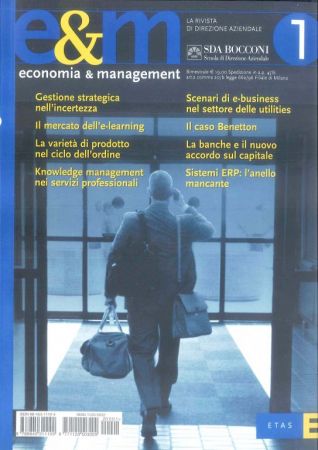
Focus forum
Area Organizzazione e Personale
Fuoricampo
Area Amministrazioni pubbliche, Sanità e Non Profit
Articoli
- Produzione e marketing dei servizi professionali: il ruolo del knowledge management
- Scenari di e-business nei settori europei delle utilities
- L’evoluzione di un network per la competizione globale. Benetton Group
- Banche e rischio di credito: riflessi organizzativi del nuovo accordo sul capitale
- Sistemi ERP e Business Process Management: il legame mancante
Fotogrammi
Management & dintorni
2001/6
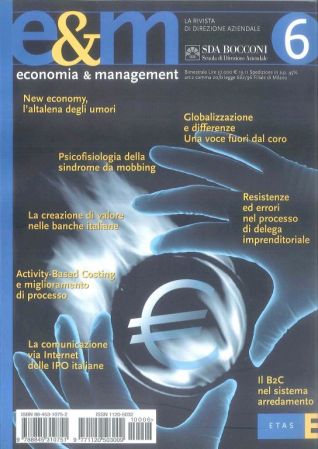
Editoriale
Focus intervista
Focus Manager allo specchio
Area Intermediazione finanziaria e Assicurazioni
Fuoricampo
Area Economia
Articoli
- Resistenze ed errori nel processo di delega imprenditoriale
- Il Business To Consumer nel sistema arredamento: ostacoli alla diffusione e condizioni di successo
- Activity-Based Costing e miglioramento di processo: potenzialità e limiti
- La comunicazione finanziaria via internet delle recenti IPO italiane
- Struttura finanziaria, costo del capitale e creazione di valore nelle banche italiane
Fotogrammi
Management & dintorni
2001/5
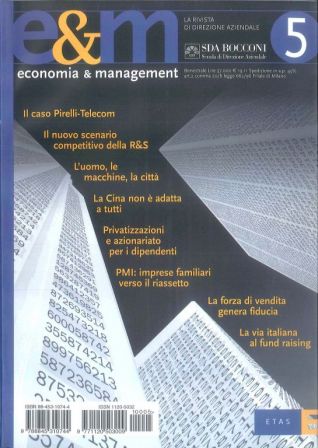
Focus forum
Focus intervista
Area Strategia
Fuoricampo
Area Tecnologia
Articoli
- La Cina non è adatta a tutti
- Piani di azionariato dei dipendenti e processi di privatizzazione delle aziende di trasporto pubblico locale
- Le medie imprese familiari verso il riassetto normativo: quale impatto sui sistemi di governance
- Il ruolo della forza vendita nella generazione di fiducia. Un’indagine empirica
- La via italiana al fund raising: intervento pubblico, filantropia e reciprocità
Fotogrammi
Management & dintorni
2001/4
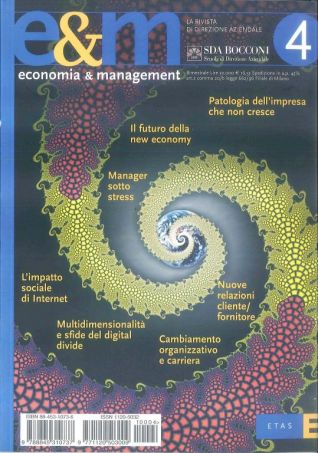
Editoriale
Focus Manager allo specchio
Area Finanza aziendale e immobiliare
Area Marketing
Articoli
- Affiliation o lock-in? Strategie di marketing per competere in internet
- Relazioni cliente/fornitore: nuovi scenari nel settore automobilistico italiano
- Cambiamento organizzativo e carriera: il caso Xelor Italia
- L'impatto sociale di Internet
- La multidimensionalità del digital divide
- Il G8 e la sfida internazionale del digital divide
Fotogrammi
2001/3
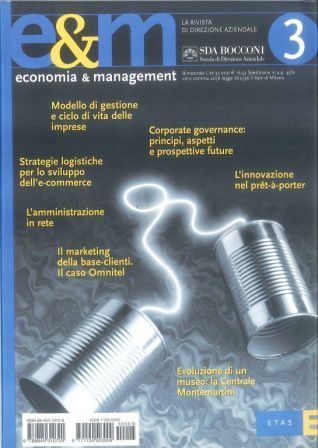
Focus intervista
Area Intermediazione finanziaria e Assicurazioni
Articoli
- Strategie logistiche per lo sviluppo dell’e-commerce: un approccio pragmatico
- Corporate governance: fondamenti, aspetti controversi e prospettive future
- L’innovazione nel prêt-à-porter: un’analisi longitudinale di Vogue Italia (1984-1999)
- Il caso Omnitel. Il marketing della base-clienti: la gestione delle relazioni di mercato in Omnitel
- Evoluzione dell’assetto istituzionale di un museo: la Centrale Montemartini
Fotogrammi
2001/2
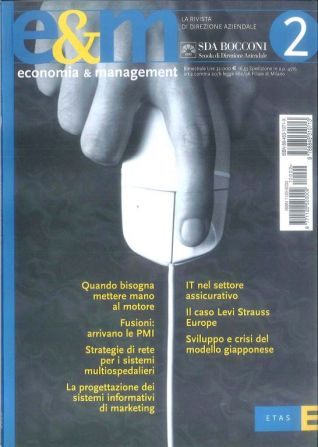
Editoriale
Area Organizzazione e Personale
Area Amministrazioni Pubbliche, Sanità e Non Profit
Articoli
- Strategie di rete per i sistemi multiospedalieri: analisi e valutazione
- La progettazione dei sistemi informativi di marketing: un approccio marketing-driven
- Information Technology, cambiamento organizzativo e produttività nel settore assicurativo italiano
- Levi’s: dal vantaggio di posizione al vantaggio di relazione. La riconfigurazione delle fonti del vantaggio competitivo di una delle imprese di abbigliamento più famose del mondo
- Sviluppo e crisi del modello giapponese di management: emerge il modello “ibrido”
Fotogrammi
2001/1
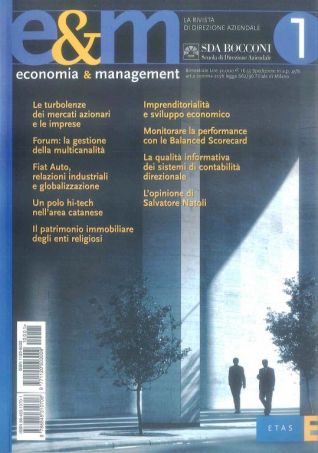
Focus forum
Area Metodi Quantitativi
Area Sistemi Informativi
Articoli
- Relazioni industriali e globalizzazione: la strategia di Fiat auto
- Microelettronica e imprenditorialità verso lo sviluppo di un polo hi-tech nell’area catanese
- Il patrimonio immobiliare degli enti religiosi. Caratteristiche, criticità, direttive di gestione e opportunità di valorizzazione
- Imprenditorialità e sviluppo economico. I risultati di una ricerca multinazionale
- Tradurre la vision aziendale in obiettivi strategici e operativi con le Balanced Scorecard
- La qualità informativa dei sistemi di contabilità direzionale. Quali metodi per valutarla?
2000/6
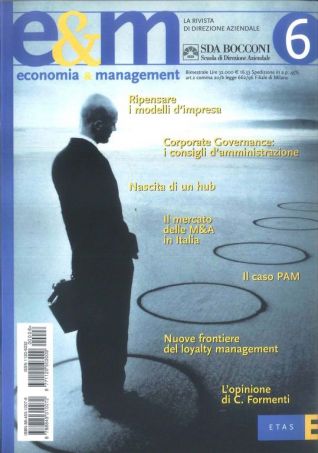
Editoriale
Area Economia
Area Strategia
Articoli
- Il mercato delle acquisizioni e delle fusioni in Italia. Le motivazioni, i settori, i prezzi pagati
- Trust-oriented marketing. La nuova frontiera del loyalty management nelle imprese commerciali
- Come nasce un hub. Governare un sistema complesso con l’approccio system dynamics
- Efficient Consumer Response nell’area logistica. L’esperienza del Gruppo PAM
Fotogrammi
2000/5
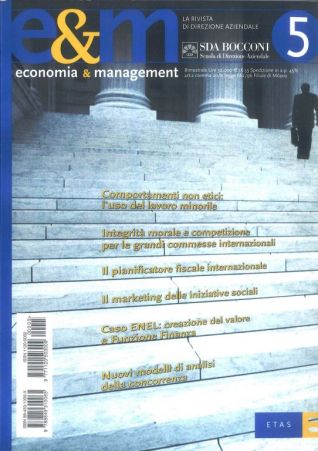
Focus forum
Area Marketing
Articoli
- Rischio aziendale e comportamenti non etici: l’utilizzo del lavoro minorile
- Integrità e competitività nei mercati delle grandi commesse internazionali
- Il ruolo della pianificazione fiscale internazionale nei gruppi di imprese. Una strategia che non riguarda soltanto le grandi multinazionali
- Il marketing delle iniziative sociali. Per un’efficace integrazione delle politiche di comunicazione delle aziende
- Creazione del valore e Funzione Finanza: il caso ENEL
- Analisi della concorrenza verso nuovi modelli?
2000/4
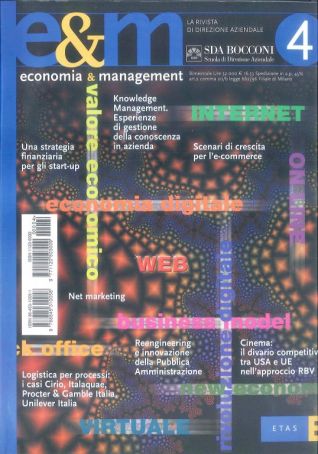
Focus forum
Area Amministrazione e Controllo
Articoli
- Il commercio elettronico: scenari per la crescita
- Net marketing. Ripensare il consumatore nel mondo della rete
- Logistica per processi nel settore dei beni di largo consumo
- Reengineering dei processi, strumento per l’innovazione della pubblica amministrazione
- Il divario competitivo tra Stati Uniti e Unione Europea nel settore cinematografico. Un’analisi secondo l’approccio Resource Based View
2000/3
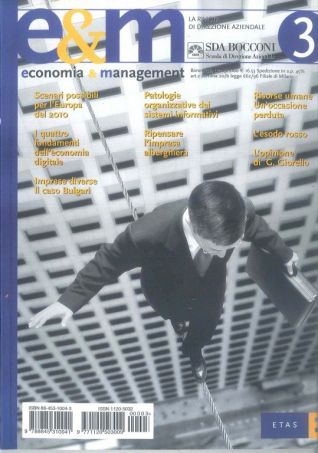
Editoriale
Area Pubblica Amministrazione
Area Tecnologia
- E-operations: nuova economia e gestione dei sistemi produttivo-logistici
- E-development: sviluppare nuovi prodotti alla velocità della rete
- La logistica distributiva nel business to consumer
- E-procurement: grandi benefici attesi, poche le esperienze concrete. Per ora...
- Il ruolo dell’ICT nell’impresa virtuale
Articoli
Fotogrammi
2000/2
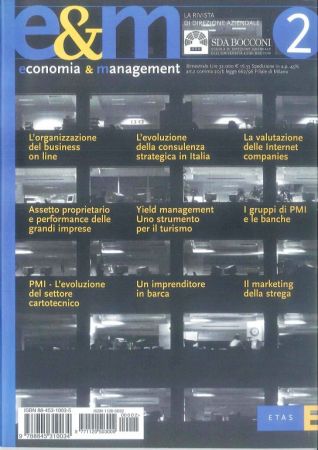
Editoriale
Focus forum
Area Finanza aziendale e immobiliare
Area Sistemi Informativi
Articoli
- Grandi imprese e grandi gruppi in Italia. Assetto proprietario e performance
- Yield management. Uno strumento innovativo per la gestione dei ricavi nelle imprese turistiche
- I gruppi di PMI: alcune evidenze sul fenomeno e implicazioni per il rapporto con le banche
- Il settore cartotecnico tra nicchia e crescita dimensionale. Va ripensata la vocazione localistica di molte PMI
2000/1
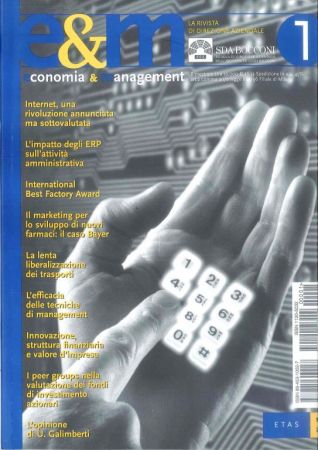
Area Credito e Assicurazioni
Area Strategia
Articoli
- I trasporti tra liberalizzazione, regimi transitori e “allenamento” alla concorrenza
- L’efficacia degli strumenti e delle tecniche di management. Una ricerca empirica sul loro impiego nelle imprese italiane
- Innovazione, struttura finanziaria e valore d’impresa
- I peer groups nella valutazione della performance dei fondi comuni di investimento azionari
- Il ruolo del marketing nello sviluppo di nuovi farmaci. Il caso Bayer
1999/6
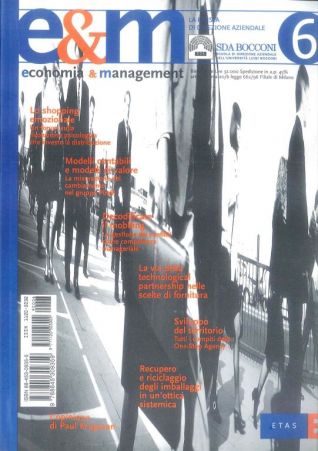
Area Amministrazione e Controllo
Area Marketing
Dossier
Articoli
- La gestione dei conflitti come competenza manageriale. Confini e ruoli da ridefinire nella rete del valore
- Le logiche di technological partnership nelle scelte di fornitura
- Strategie di sviluppo del territorio: il ruolo delle One-Stop Agency. Esperienze internazionali a confronto
- Recupero e riciclaggio degli imballaggi. La soluzione c’è, ma in un’ottica sistemica
1999/5
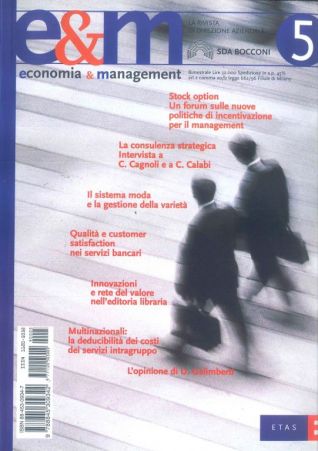
Editoriale
Area Tecnologia
Fotogrammi
Area Organizzazione e Personale
Articoli
- Il sistema moda e la gestione della varietà. Logiche di intervento per recuperare efficacia sul mercato e efficienza nei processi operativi. L’approccio VRP
- Qualità e customer satisfaction nei servizi bancari. Modelli e metodologie di misurazione
- Cambia l’editoria libraria. Confini e ruoli da ridefinire nella rete del valore
- Multinazionali: la deducibilità dei costi dei servizi infragruppo. Condizioni e presupposti di deducibilità dei costi per servizi sostenuti da un'unità centrale in favore di una consociata italiana
1999/4
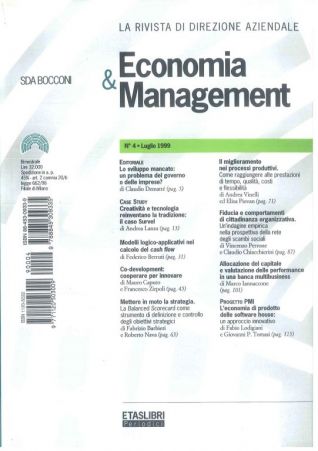
Interventi
Interventi
- Mettere in moto la strategia. La Balanced Scorecard come strumento di definizione e controllo degli obiettivi strategici
- Il miglioramento nei processi produttivi. Come raggiungere alte prestazioni di tempo, qualità, costi e flessibilità
- Fiducia e comportamenti di cittadinanza organizzativa. Un’indagine empirica nella prospettiva della rete degli scambi sociali
- Allocazione del capitale e valutazione delle performance in una banca multibusiness
1999/3
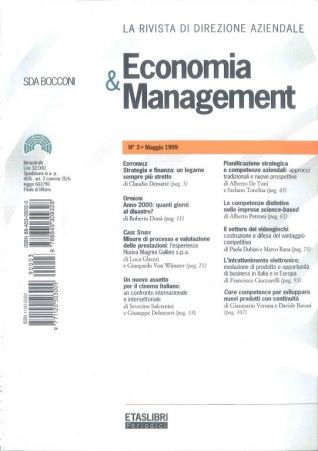
Case study
Interventi
- Un nuovo assetto per il cinema italiano. Un confronto internazionale e intersettoriale
- Pianificazione strategica e competenze aziendali. Approcci tradizionali e nuove prospettive
- Le competenze distintive nelle imprese science-based
- Il settore dei videogiochi. Costruzione e difesa del vantaggio competitivo
Fotogrammi
Interventi
1999/2
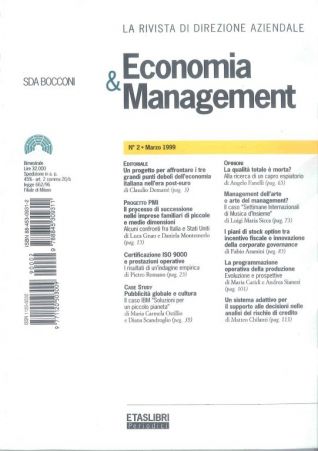
Editoriale
Fotogrammi
Interventi
- Management dell’arte o arte del management? Il caso “Settimane Internazionali di Musica d’Insieme”
- I piani di stock option fra incentivo fiscale e innovazione della corporate governance
- La programmazione operativa della produzione. Evoluzione e prospettive
- Un sistema adattivo per il supporto alle decisioni nelle analisi del rischio di credito
1999/1
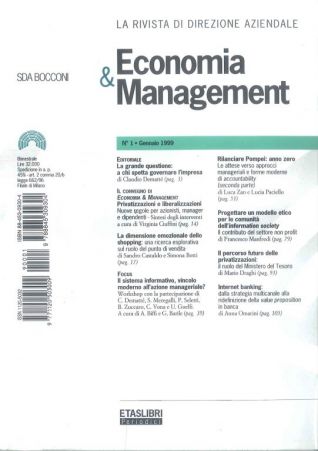
Il Convegno di "Economia & Management"
Interventi
Interventi
1998/6
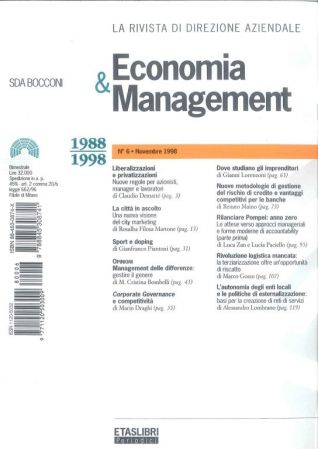
Editoriale
Interventi
Interventi
- Dove studiano gli imprenditori
- Nuove metodologie di gestione del rischio di credito e vantaggi competitivi per le banche
- Rilanciare Pompei: anno zero. Le attese verso approcci manageriali e forme moderne di accountability
- Rivoluzione logistica mancata: la terziarizzazione offre un’opportunità di riscatto
- L’autonomia degli enti locali e le politiche di esternalizzazione: basi per la creazione di reti di servizi
1998/5
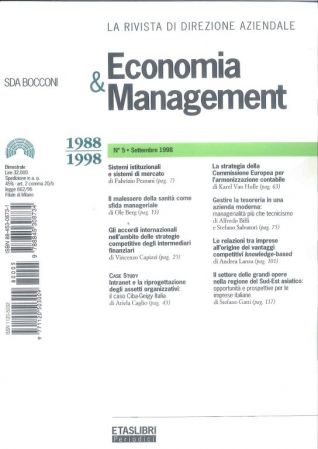
Interventi
Interventi
- La strategia della Commissione Europea per l’armonizzazione contabile
- Gestire la tesoreria in una azienda moderna: managerialità più che tecnicismo
- Le relazioni tra imprese all’origine dei vantaggi competitivi knowledge-based
- Il settore delle grandi opere nella regione del Sud-Est asiatico. Opportunità e prospettive per le imprese italiane
1998/4
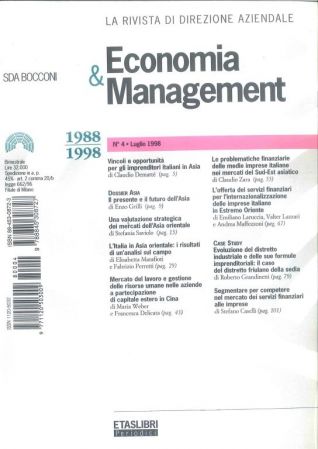
Dossier Asia
- Il presente e il futuro dell’Asia
- Una valutazione strategica dei mercati dell’Asia orientale
- L’Italia in Asia orientale: i risultati di un’analisi sul campo
- Mercato del lavoro e gestione delle risorse umane nelle aziende a partecipazione di capitale estero in Cina
- Le problematiche finanziarie delle medie imprese italiane nei mercati del Sud-Est asiatico
- L’offerta di servizi finanziari per l’internazionalizzazione delle imprese italiane in Estremo Oriente
1998/3
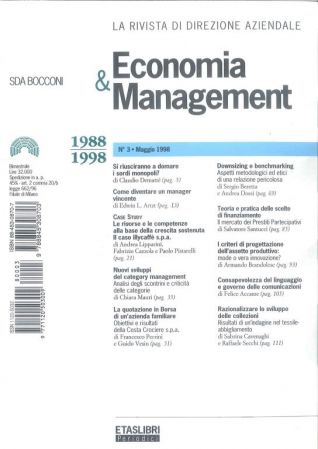
Interventi
Interventi
- Nuovi sviluppi del category management. Analisi degli scontrini e criticità delle categorie
- La quotazione in Borsa di un’azienda familiare. Obiettivi e risultati della Costa Crociere s.p.a.
- Downsizing e benchmarking. Aspetti metodologici ed etici di una relazione pericolosa
- I criteri di progettazione dell’assetto produttivo: mode o vera innovazione?
1998/2
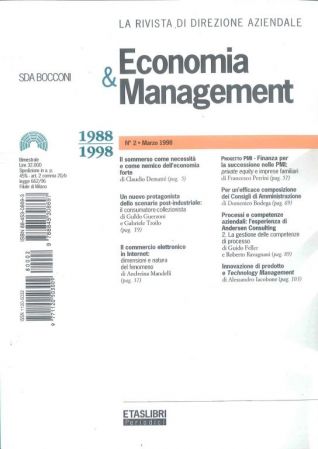
Interventi
1998/1
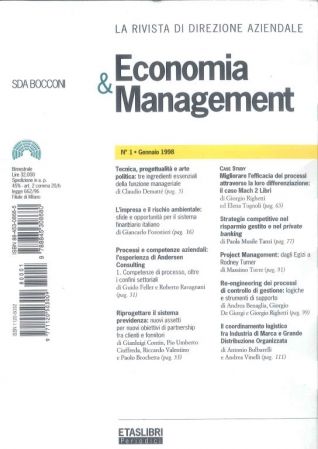
Editoriale
Interventi
- L’impresa e il rischio ambientale. Sfide e opportunità per il sistema finanziario italiano
- Processi e competenze aziendali: l’esperienza di Andersen Consulting. 1. Competenze di processo, oltre i confini settoriali
- Riprogettare il sistema previdenza. Nuovi assetti per nuovi obiettivi di partnership tra clienti e fornitori
Case study
Interventi
1997/6
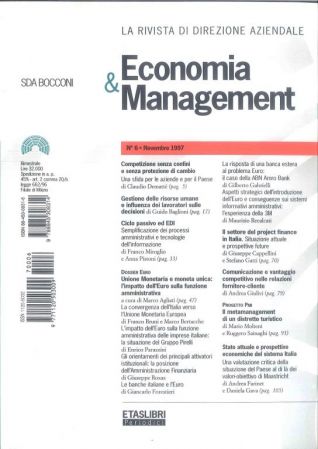
Interventi
Dossier Euro
- Unione monetaria e moneta unica. L’impatto dell’Euro sulla funzione amministrativa
- La convergenza dell’Italia verso l’Unione Monetaria Europea
- L’impatto dell’Euro sulla funzione amministrativa delle imprese italiane: la situazione del Gruppo Pirelli
- Gli orientamenti dei principali attivatori istituzionali: la posizione dell’Amministrazione Finanziaria
- Le banche italiane e l’Euro
- La risposta di una banca estera al problema Euro: il caso della ABN Amro Bank
- Aspetti strategici dell’introduzione dell’Euro e conseguenze sui sistemi informativi amministrativi: l’esperienza della 3M
Interventi
Progetto PMI
1997/5
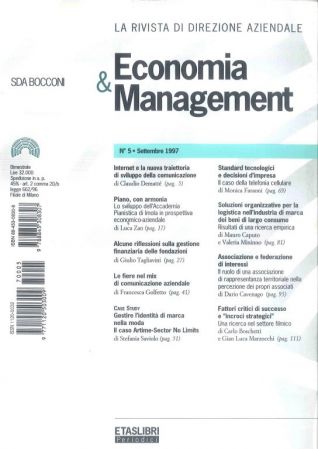
Interventi
Fotogrammi
Interventi
Interventi
- Standard tecnologici e decisioni d’impresa. Il caso della telefonia cellulare
- Soluzioni organizzative per la logistica nell’industria di marca dei beni di largo consumo. Risultati di una ricerca empirica
- Associazione e federazione di interessi. Il ruolo di una associazione di rappresentanza territoriale nella percezione dei propri associati
- Fattori critici di successo e “incroci strategici”. Una ricerca nel settore filmico
1997/4
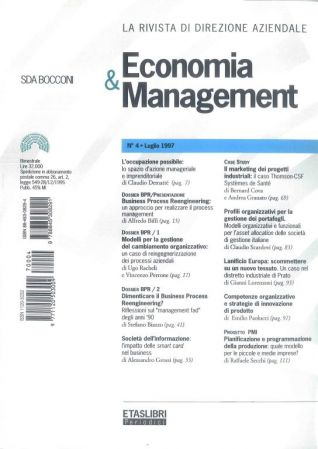
Dossier BPR
Fotogrammi
Interventi
- Profili organizzativi per la gestione dei portafogli. Modelli organizzativi e funzionali per l’asset allocation delle società di gestione italiane
- Lanificio Europa: scommettere su un nuovo tessuto. Un caso nel distretto industriale di Prato
- Competenze organizzative e strategie di innovazione di prodotto
1997/3
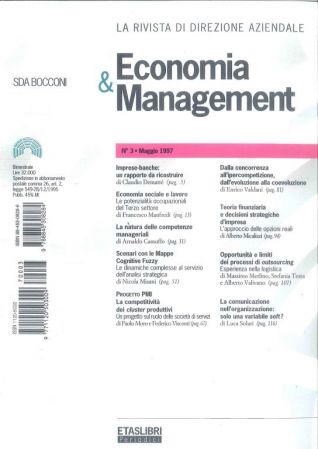
Interventi
Progetto PMI
Interventi
1997/2
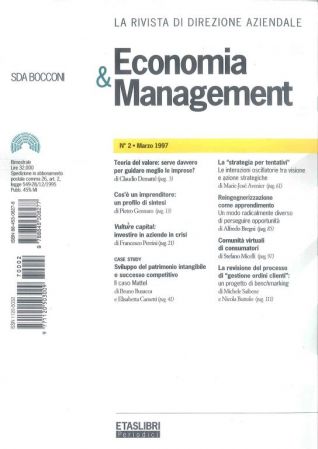
Interventi
Fotogrammi
Interventi
- La “strategia per tentativi”. Le interazioni oscillatorie tra visione e azione strategiche
- Reingegnerizzazione come apprendimento. Un modo radicalmente diverso di perseguire opportunità
- Comunità virtuali di consumatori
- La revisione del processo di “gestione ordini clienti”: un progetto di benchmarking
1997/1
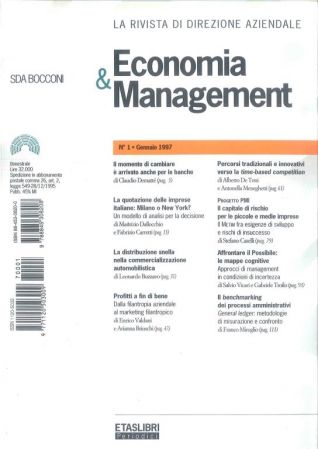
Interventi
- La quotazione delle imprese italiane: Milano o New York? Un modello di analisi per la decisione
- La distribuzione snella nella commercializzazione automobilistica
- Profitti a fin di bene. Dalla filantropia aziendale al marketing filantropico
- Percorsi tradizionali e innovativi verso la time-based competition
Progetto PMI
Interventi
1996/6
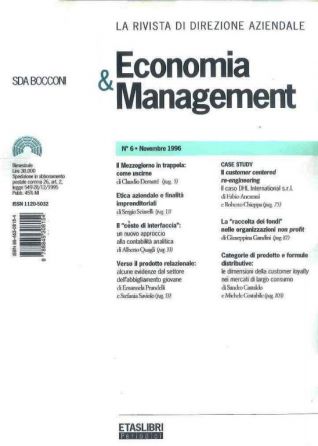
Interventi
Interventi
1996/5
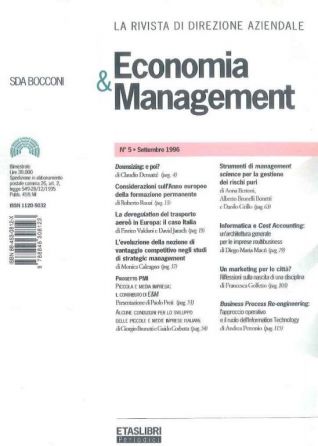
Editoriale
Fotogrammi
Interventi
Progetto PMI
Interventi
- Strumenti di management science per la gestione dei rischi puri
- Informatica e Cost Accounting. Un’architettura generale per le imprese multibusiness
- Un marketing per le città? Riflessioni sulla nascita di una disciplina
- Business Process Re-engineering. L’approccio operativo e il ruolo dell’Information Technology
1996/4
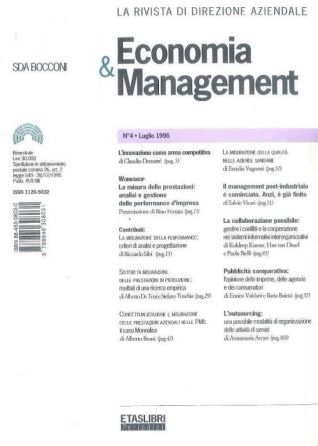
Editoriale
Workshop
- La misurazione della performance. Criteri di analisi e progettazione
- I sistemi di misurazione delle prestazioni in produzione. Risultati di una ricerca empirica
- Concettualizzazione e misurazione delle prestazioni aziendali nelle PMI. Il caso Monnalisa
- La misurazione della qualità nelle aziende sanitarie
1996/3
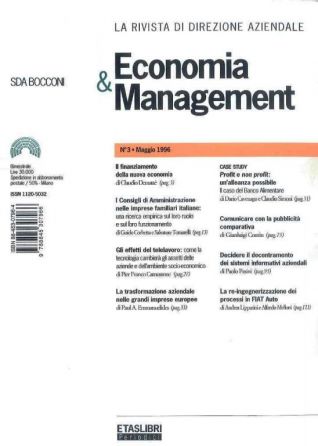
Editoriale
Interventi
1996/2
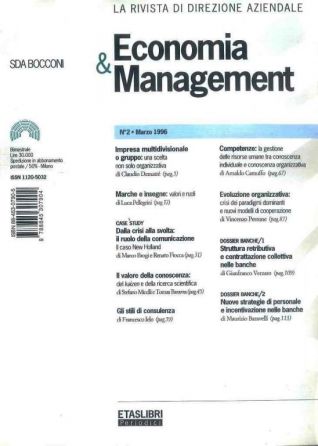
Interventi
Interventi
1996/1
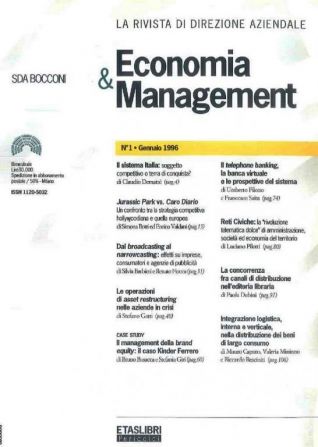
Interventi
Interventi
- Il telephone banking, la banca virtuale e le prospettive del sistema
- Reti Civiche: la “rivoluzione telematica dolce” di amministrazione, società ed economia del territorio
- La concorrenza fra canali di distribuzione nell’editoria libraria
- Integrazione logistica, interna e verticale, nella distribuzione dei beni di largo consumo
 2025/4
2025/4